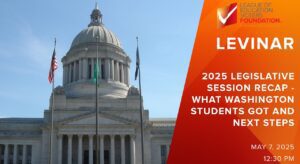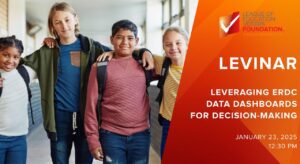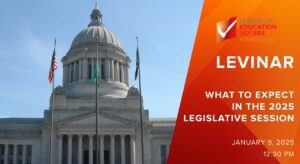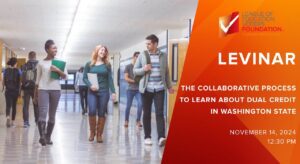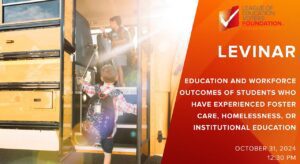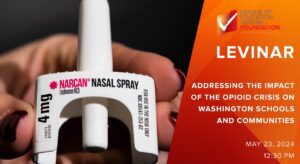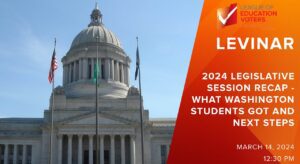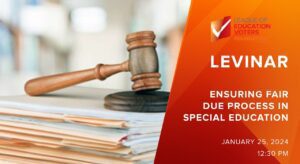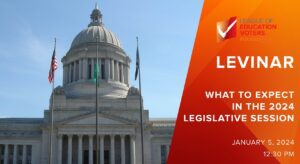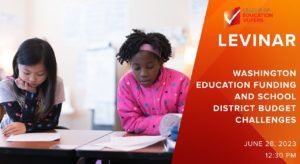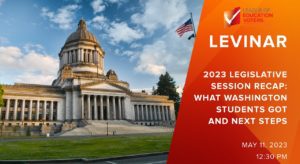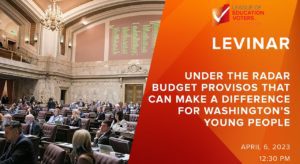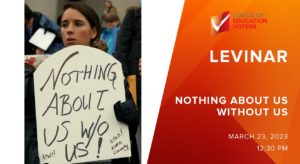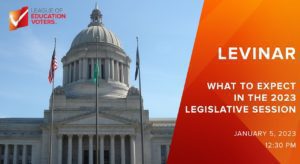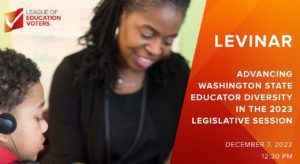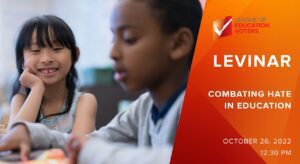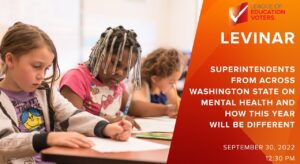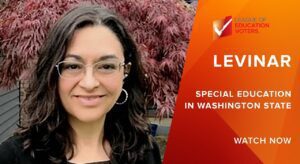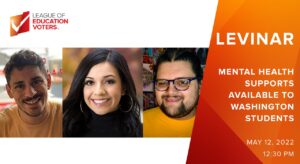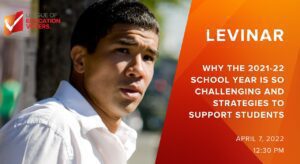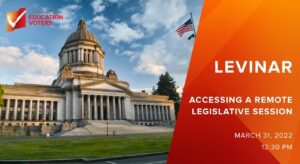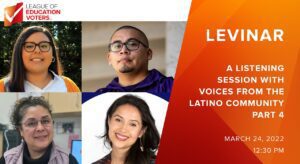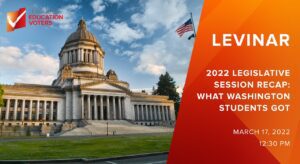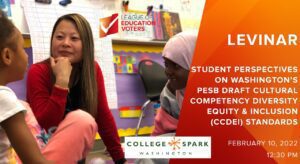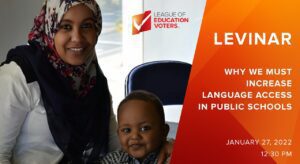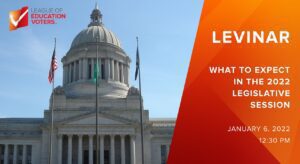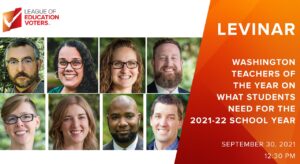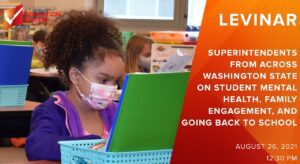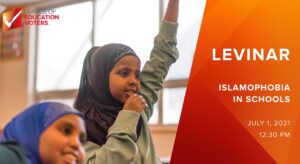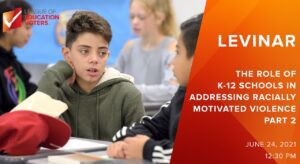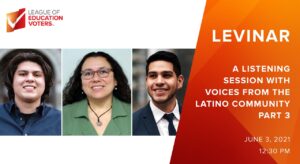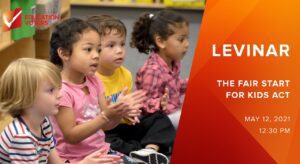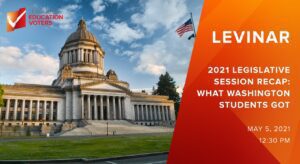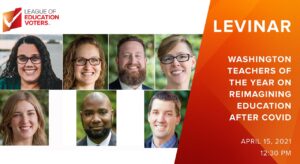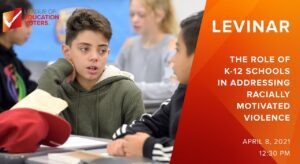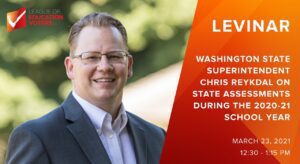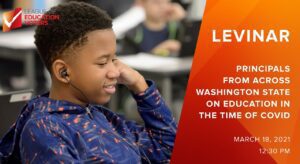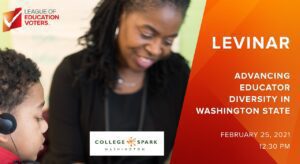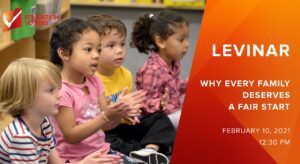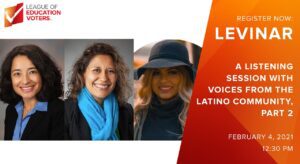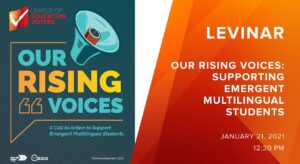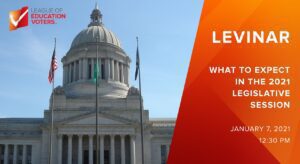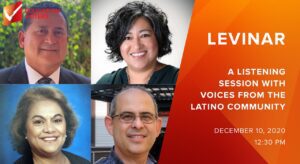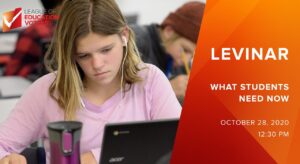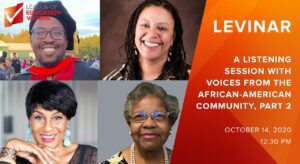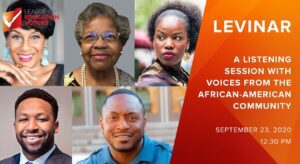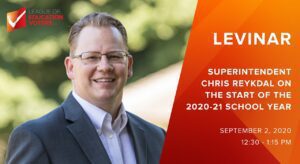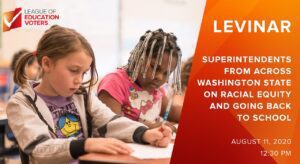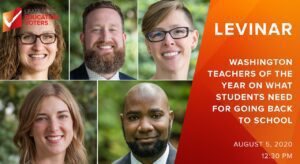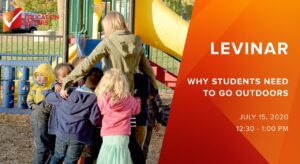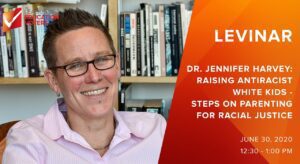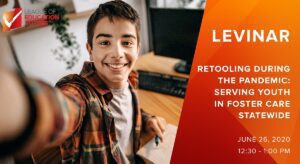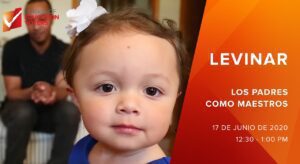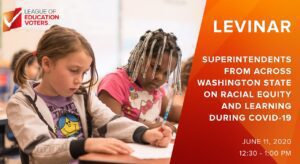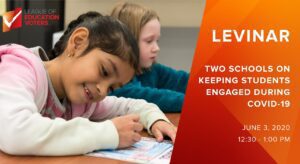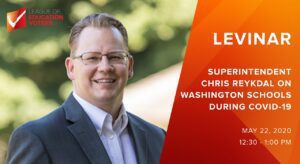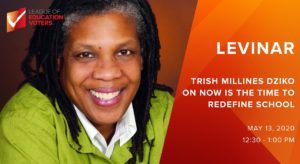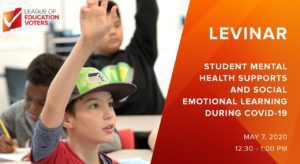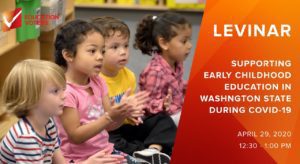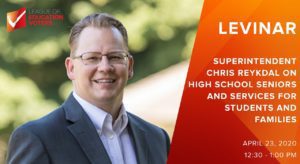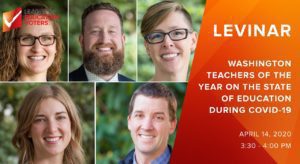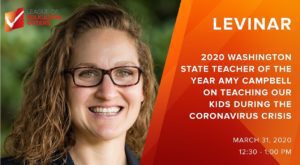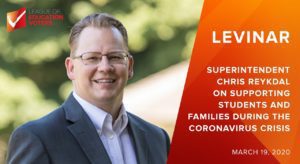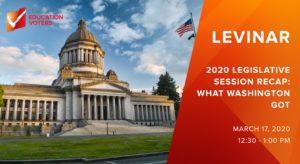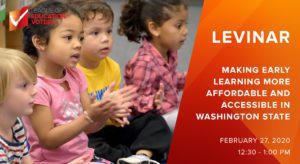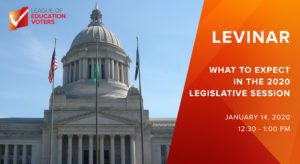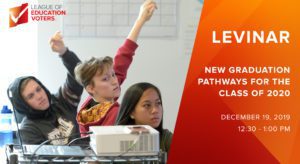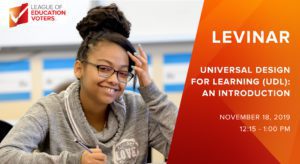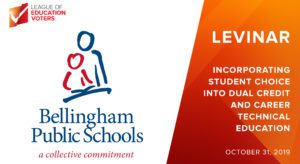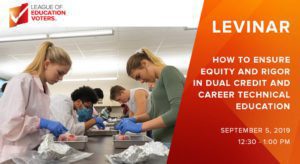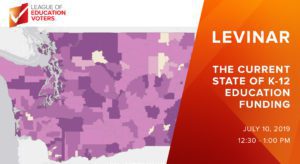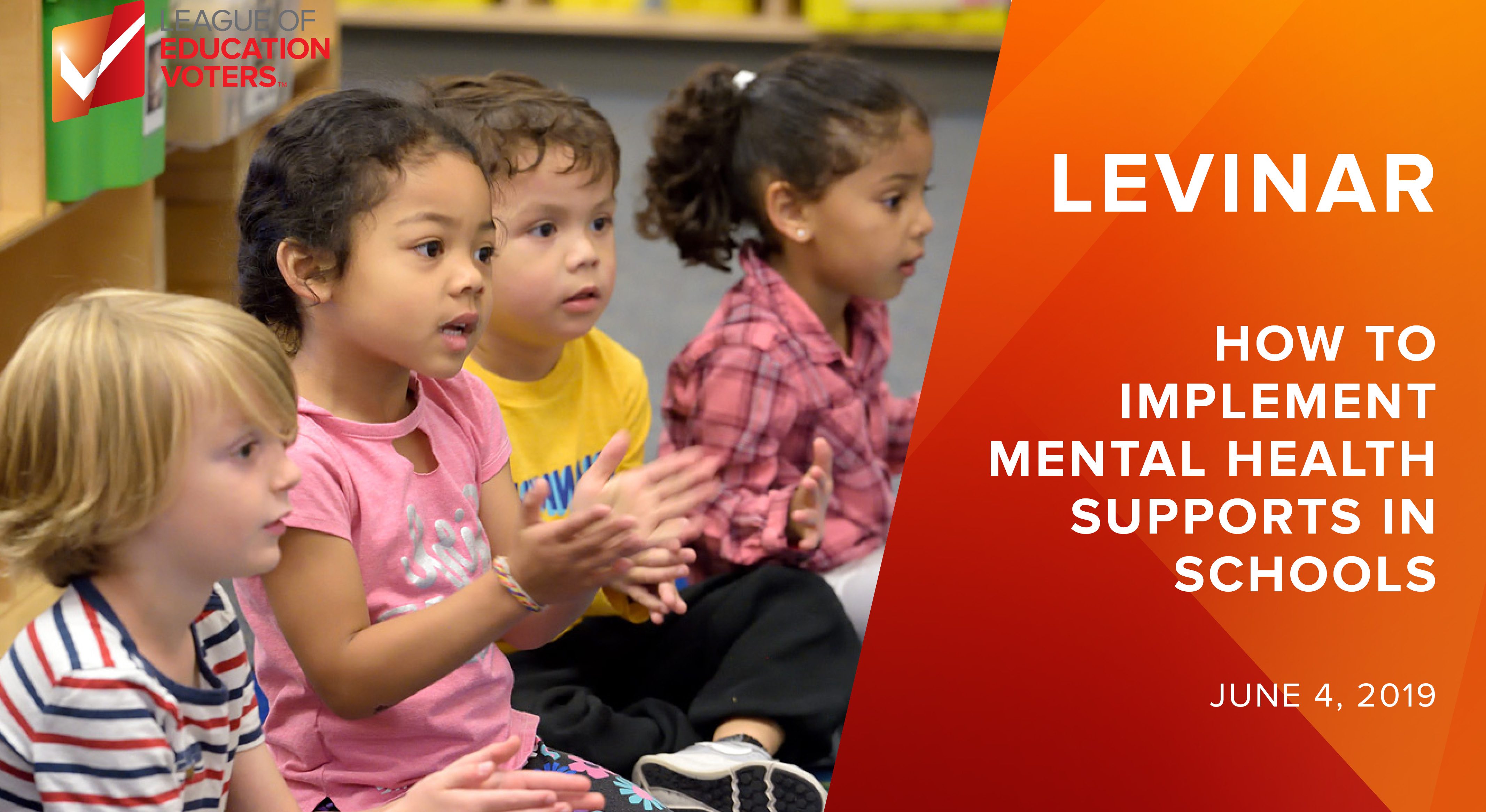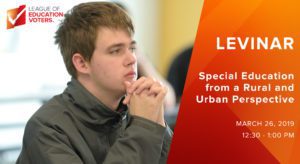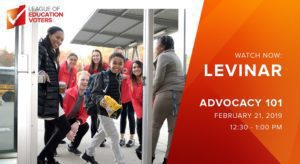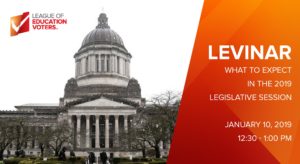Previous LEVinars
Below you will find the presentations and audio from previous LEVinar presentations. To view information about current or upcoming LEVinars, please visit our Lunchtime LEVinars web page.
- Superintendents from Across Washington state on Best Practices, Data, and Challenges (June 2025)
- How Washington Students Use Artificial Intelligence in the Classroom (May 2025)
- 2025 Legislative Session Recap: What Washington Students Got and Next Steps (May 2025)
- Left to Chance: Student Outcomes in Seattle Public Schools from 1990 to 2024 (April 2025)
- Budget Priorities Across the Education Ecosystem: From Early Learning to Higher Ed (April 2025)
- Equity in Education: From Research to Action (April 2025)
- Washington state Teachers of the Year on Maintaining Strong and Welcoming Public Schools (March 2025)
- Supporting LGBTQ+ Students in Schools: Advocacy and Policy Updates (March 2025)
- How to Support Washington state’s Undocumented / Mixed Status Students and Families in Schools (February 2025)
- Leveraging ERDC Data Dashboards for Decision-Making (January 2025)
- What to Expect in the 2025 Legislative Session (January 2025)
- The Collaborative Process to Learn about Dual Credit in Washington state (November 2024)
- Education and Workforce Outcomes of Students Who Have Experienced Foster Care, Homelessness, or Institutional Education (October 2024)
- Impacts of the 2024 Washington state Ballot Initiatives (October 2024)
- Washington’s Response to Student Mental Health (September 2024)
- What Values and Goals Should Provide the Foundation of Our Education System? (September 2024)
- The State of Equitable Education Funding in Washington (August 2024)
- The Role of Artificial Intelligence in Education (June 2024)
- Addressing the Impact of the Opioid Crisis on Washington Schools and Communities (May 2024)
- Do Smartphones Belong in K-12 Classrooms? (May 2024)
- How Our Institutions Are Accommodating and Navigating the Delay in Higher Education Financial Aid for 2024 (March 2024)
- 2024 Legislative Session Recap: What Washington Students Got and Next Steps (March 2024)
- How to Expand Access to Higher Education Through the College Promise Model (February 2024)
- Ensuring Fair Due Process in Special Education (January 2024)
- What to Expect in the 2024 Legislative Session (January 2024)
- Pathways of Change: A Journey through Institutional Transformation (January 2024)
- Washington state Teachers of the Year on What Students Need Now (December 2023)
- Youth Substance Use Prevention (November 2023)
- Advancing Washington state Educator Diversity in School Districts and School Buildings (October 2023)
- Lifesaving Skills: Youth Suicide Prevention Through Social-Emotional Learning (September 2023)
- Washington Education Funding and School District Budget Challenges (June 2023)
- 2023 Legislative Session Recap: What Washington Students Got and Next Steps (May 2023)
- Under the Radar Budget Provisos that Can Make a Difference for Washington’s Young People (April 2023)
- Nothing About Us Without Us (March 2023)
- The Special Education Funding Cap (February 2023)
- Ending Isolation Practices in Washington K-12 Schools (January 2023)
- What to Expect in the 2023 Legislative Session (January 2023)
- Advancing Washington state Educator Diversity in the 2023 Legislative Session (December 2022)
- A Discussion about Critical Race Theory in K-12 Classrooms (November 2022)
- Combating Hate in Education (October 2022)
- Superintendents from Across Washington state on Mental Health and How This Year Will Be Different (September 2022)
- Special Education in Washington state (August 2022)
- Washington state Teachers of the Year on What Students Need for 2022-23 (July 2022)
- A Listening Session with Voices from the Asian American and Pacific Islander Community (June 2022)
- Mental Health Supports Available to Washington Students (May 2022)
- Why the 2021-22 School Year Is So Challenging and Strategies to Support Students (April 2022)
- Accessing a Remote Legislative Session (March 2022)
- A Listening Session with Voices from the Latino Community, Part 4 (March 2022)
- 2022 Legislative Session Recap: What Washington Students Got (March 2022)
- Students from Across Washington on What They Need Now and How to Advocate (February 2022)
- Student Perspectives on Washington’s PESB Draft Cultural Competency Diversity Equity & Inclusion (CCDEI) Standards (February 2022)
- Why We Must Increase Language Access in Public Schools (January 2022)
- What to Expect in the 2022 Legislative Session (January 2022)
- Build Back Better and Supporting the Child Care Workforce in Washington state (December 2021)
- Honoring and Supporting Native Students (December 2021)
- The Role of K-12 Schools in Addressing Racism, Part 3 (October 2021)
- Washington state Teachers of the Year on What Students Need for the 2021-22 School Year (September 2021)
- Superintendents from Across Washington state on Student Mental Health, Family Engagement, and Going Back to School (August 2021)
- Islamophobia in Schools (July 2021)
- The Role of K-12 Schools in Addressing Racially Motivated Violence, Part 2 (June 2021)
- A Listening Session with Voices from the Latino Community, Part 3 (June 2021)
- The Fair Start for Kids Act (May 2021)
- 2021 Legislative Session Recap: What Washington Students Got (May 2021)
- Washington state Teachers of the Year on Reimagining Education after COVID (April 2021)
- The Role of K-12 Schools in Addressing Racially Motivated Violence (April 2021)
- Washington state Superintendent Chris Reykdal on State Assessments during the 2020-21 School Year (March 2021)
- Principals from across Washington state on Education in the Time of COVID (March 2021)
- Advancing Educator Diversity in Washington state (February 2021)
- Why Every Family Deserves a Fair Start (February 2021)
- A Listening Session with Voices from the Latino Community, Part 2 (February 2021)
- Our Rising Voices: Supporting Emergent Multilingual Students (January 2021)
- What to Expect in the 2021 Legislative Session (January 2021)
- A Listening Session with Voices from the Latino Community (December 2020)
- Supporting Students Experiencing Homelessness in the Time of COVID (November 2020)
- What Students Need Now (October 2020)
- A Listening Session with Voices from the African-American Community, Part 2 (October 2020)
- A Listening Session with Voices from the African-American Community (September 2020)
- Superintendent Chris Reykdal on the Start of the 2020-21 School Year (September 2020)
- Superintendents from Across Washington state on Racial Equity and Going Back to School (August 2020)
- Washington Teachers of the Year on What Students Need for Going Back to School (August 2020)
- Fostering First Steps Toward Racial Healing (July 2020)
- Why Students Need to Go Outdoors (July 2020)
- Raising Antiracist White Kids – Steps on Parenting for Racial Justice (June 2020)
- Retooling During the Pandemic: Serving Youth in Foster Care Statewide (June 2020)
- Los Padres como Maestros (June 2020)
- Superintendents from Across Washington state on Racial Equity and Learning during COVID-19 (June 2020)
- Two Schools on Keeping Students Engaged During COVID-19 (June 2020)
- Superintendent Chris Reykdal on Washington Schools During COVID-19 (May 2020)
- Now Is the Time to Redefine School (May 2020)
- Student Mental Health Supports and Social-Emotional Learning during COVID-19 (May 2020)
- Supporting Early Childhood Education in Washington state during COVID-19 (April 2020)
- Superintendent Chris Reykdal on High School Seniors and Services for Students and Families (April 2020)
- Washington Teachers of the Year on the State of Education during COVID-19 (April 2020)
- 2020 Washington state Teacher of the Year Amy Campbell on Teaching Our Kids During the Coronavirus Crisis (March 2020)
- Superintendent Chris Reykdal on Supporting Students and Families during the Coronavirus Crisis (March 2020)
- 2020 Legislative Session Recap: What Washington Got (March 2020)
- Making Early Learning More Affordable and Accessible in Washington state (February 2020)
- What to Expect in the 2020 Legislative Session (January 2020)
- New Graduation Pathways for the Class of 2020 (December 2019)
- Universal Design for Learning (UDL): An Introduction (November 2019)
- Incorporating Student Choice into Dual Credit and Career Technical Education (October 2019)
- How to Ensure Equity and Rigor in Dual Credit and Career Technical Education (September 2019)
- The Current State of K-12 Education Funding (July 2019)
- How to Implement Mental Health Supports in Schools (June 2019)
- Special Education from a Rural and Urban Perspective (March 2019)
- Advocacy 101 (February 2019)
- What to Expect in the 2019 Legislative Session (January 2019)
- The Special Education Landscape in Washington (October 2018)
- Finances Behind Teacher Salary Negotiations (September 2018)
- Concrete Practices to Support Students Impacted by ACEs and Complex Trauma (June 2018)
- Education Funding Inequities Across Washington: A Deeper Dive (May 2018)
- Education Funding Inequities Across Washington (May 2018)
- Proposed Changes to the Student Discipline Rules (April 2018)
- Changes to Education Finance in Washington state (March 2018)
- Co-Designing Family Engagement (March 2018)
- The 2018 Education Funding Proposals, Side-By-Side (February 2018)
- The 2018 Legislative Session and 2017 in Review (January 2018)
- The Latest Washington Supreme Court McCleary Ruling (December 2017)
- How Washington’s Student Outcomes Compare with Other States (October 2017)
- Next Steps in School Discipline (September 2017)
- Washington’s Plan for the Every Student Succeeds Act (August 2017)
- What You Need to Know about the McCleary School Funding Agreement (July 2017)
- How ACEs and Complex Trauma Impacts Student Learning (July 2017)
- Activating Education and Justice Communities to Support Youth in Crisis (June 2017)
- How to Retain and Support Teachers of Color (May 2017)
- 2017 Legislative Session Update: Where We Stand (April 2017)
- How Early Learning Fits into the Education Continuum (March 2017)
- Student Supports, an Integral Component of Basic Education (February 2017)
- Career Connected Learning and STEM (January 2017)
- What to Expect in the 2017 Legislative Session (December 2016)
- Education Funding Takeaways from California (November 2016)
- OSPI Roles and Responsibilities (October 2016)
- Expanded Learning Opportunities (September 2016)
- The Opportunity Gap Bill: Next Steps (August 2016)
- Every Student Succeeds Act (ESSA): What You Need to Know, Part 1 (July 2016)
- Every Student Succeeds Act (ESSA): What You Need to Know, Part 2 (July 2016)
Superintendents from Across Washington state on Best Practices, Data, and Challenges
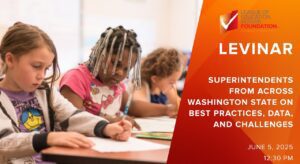
As the 2024-25 school year wraps up, school districts across Washington state are focusing on improving academic success, student and staff supports, and transitions to postsecondary education in the wake of this year’s budget challenges.
In this webinar, a panel of superintendents from across Washington state share how they are supporting academic preparedness, student social-emotional and physical well-being, and college and career knowledge, what data they are monitoring to determine whether their strategies are effective, and what challenges they see on the horizon.
Panelists:
Dr. Susana Reyes, Shoreline Public Schools
Dr. Concie Pedroza, Tukwila School District
Dr. Nik Bergman, Quincy School District
Dr. Ivan Duran, Highline Public Schools
Dr. Christopher Nesmith, Elma School District
Arik Korman, League of Education Voters
June 5, 2025
Archived Recording (Closed captioning is available in English, Spanish, and Somali) | Shoreline Public Schools presentation slides | Tukwila School District presentation slides | Highline Public Schools presentation slides | Elma School District presentation slides | Quincy School District presentation slides | The Opportunity Atlas | AI Summary
How Washington Students Use Artificial Intelligence in the Classroom
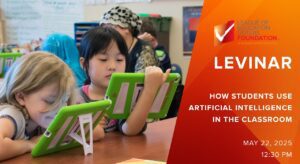
Teachers across Washington state are incorporating artificial intelligence (AI) in their work, but how are students actually using it in the classroom?
In this webinar, a panel of students from across the state share their experience with AI and what they would like to see in the future. We also learn about new research on AI in education from Dr. Min Sun, a professor at the University of Washington and Co-Founder of Colleague AI, whose team has recently conducted pilot studies with a group of educators and their students about the question of how teachers and students can leverage AI to classroom discourses to amplify human relationships and students’ critical thinking.
Panelists:
Paree Raval, a junior at Sammamish High School in the Bellevue School District and a 1st-year member of the Washington state Legislative Youth Advisory Council (LYAC)
Mayah Stewart, a senior at Montesano High School in the Montesano School District and a 2nd-year member of the Washington state Legislative Youth Advisory Council (LYAC)
Ananya Swaminathan, a junior at Redmond High School in the Lake Washington School District and a 1st-year member of the Washington state Legislative Youth Advisory Council (LYAC)
Lilah Wakefield, a freshman at Bainbridge Island High School in the Bainbridge Island School District and a 1st-year member of the Washington state Legislative Youth Advisory Council (LYAC)
Richie Martinez, a senior at Columbia Basin College studying Cyber Security and the Columbia Region Coordinator of the Washington Student Engagement Networks (WA-SEN)
Jordan Verkh-Haskell, a recent graduate of the University of Puget Sound with a degree in Computer Science and the South Sound Region Coordinator of the Washington Student Engagement Networks (WA-SEN)
Dr. Min Sun, a professor at the University of Washington College of Education and Co-Founder of Colleague AI
Arik Korman, League of Education Voters
May 22, 2025
Archived Recording (Closed captioning is available in English, Spanish, and Somali) | AI Summary | Colleague AI Blog
2025 Legislative Session Recap: What Washington Students Got and Next Steps
To wrap up the 2025 Legislative Session, League of Education Voters (LEV) Chief Policy Officer Jacob Vela, government relations consultant Carey Morris, and LEV partners provide an overview of what happened in Olympia.
In this webinar, they also share what we can do to prepare for the upcoming session in 2026 and answer your questions.
Panelists:
Abby Hill, a sophomore at Spokane Valley Tech STEM Academy in the Central Valley School District and a member of the Association of Washington Student Leaders (AWSL)
Ruben Flores, Executive Director at the Washington State Council of Presidents
Eli Taylor Goss, Executive Director at the Washington State Budget & Policy Center
Ramona Hattendorf, Director of Public Policy and Civic Engagement at The Arc of King County
Jonathan Teeters, Policy Director at Empire Health Foundation
Katy Warren, Deputy Director at Washington State Association of Head Start & ECEAP
Jessica Winston, Policy and Advocacy Manager at School’s Out Washington
Carey Morris, Government Relations Consultant
Jacob Vela, League of Education Voters
Arik Korman, League of Education Voters
May 7, 2025
Archived Recording (Closed captioning is available in English, Spanish, and Somali) | LEV 2025-27 Biennial Budget Summary | Early Learning 2025-27 Biennial Budget Summary by Start Early Washington | Washington State Association of Head Start & ECEAP presentation slides | Washington State Budget & Policy Center budget shortfall fact sheet | AI Summary
Left to Chance: Student Outcomes in Seattle Public Schools from 1990 to 2024
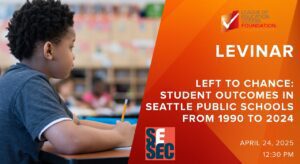
To understand why we can be optimistic about the future of public education, we must first recognize how our understanding of educational improvement has evolved over the past several decades. The journey of Seattle Public Schools, like that of many urban districts, reveals a progression in our collective knowledge about creating effective educational systems that serve all students well.
In this webinar, Vivian van Gelder, Director of Policy and Research at the Southeast Seattle Education Coalition (SESEC), presents the culmination of over 10 years of research into the history of Seattle Public Schools. She highlights her latest report on how the district became decentralized, resulting in “100-plus separate school systems.” She also shares recommendations by SESEC on how to best move forward and address the education inequities that resulted from the fragmentation.
Panelists:
Vivian van Gelder, Southeast Seattle Education Coalition
Arik Korman, League of Education Voters
April 24, 2025
Archived Recording (Closed captioning is available in English, Spanish, and Somali) | Presentation Slides | AI Summary
Budget Priorities Across the Education Ecosystem: From Early Learning to Higher Ed
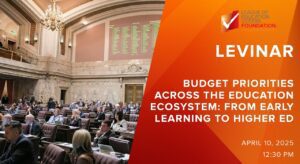 The upcoming state budget decisions in Washington will have a far-reaching impact across every level of education, from early learning through higher education. The choices made in Olympia will affect children and families in different ways, with key investments shaping opportunities for equity, access, and success for young people across the state.
The upcoming state budget decisions in Washington will have a far-reaching impact across every level of education, from early learning through higher education. The choices made in Olympia will affect children and families in different ways, with key investments shaping opportunities for equity, access, and success for young people across the state.
In this webinar, we examine how budget and investment priorities across various sectors of the education ecosystem are connected and how they influence equity for students. We explore how decisions in areas such as early learning, inclusive practices, youth diversion programs, and higher education funding can drive meaningful change for students of all backgrounds.
Key questions include:
- What impact will proposed cuts in early learning and higher education have on access, equity, and outcomes for students, particularly those from underserved communities?
- What is needed to ensure sufficient funding for inclusive practices and equity in Washington’s schools?
- How can investments in youth criminal justice and diversion programs improve outcomes for young people involved in the justice system?
- How do new revenue proposals support sustainable investments in education across all levels?
Join us for a conversation with experts across these sectors to explore how budget priorities intersect to impact Washington’s students, and how these decisions can help promote a more equitable and inclusive future.
Panelists:
Paree Raval, a junior at Sammamish High School in the Bellevue School District and member of the Washington state Legislative Youth Advisory Council (LYAC)
Sabina Kolovyansky, a junior at Sammamish High School in the Bellevue School District and member of the Washington state Legislative Youth Advisory Council (LYAC)
Sergio Acuna, a student at Highline College and student leader at Communities for Our Colleges
Kerra Bower, Executive Director of Raze Early Learning & Development Center
Lilly Deerwater, Economic Inequity & Health Program Manager at Washington Physicians for Social Responsibility and steering committee member of the Balance Our Tax Code Coalition
Barbara Gilchrist, Director of Coalition & Government Relations at the Washington State Charter Schools Association
Roxana Gomez, Director of Policy and Systemic Advocacy at Legal Counsel for Youth and Children (LCYC)
Nikki Otero Lockwood, President of the Spokane Public Schools Board of Directors
David Mendez, Associate Director of the True Measure Collaborative
Dawn Rains, Chief Executive Officer of Treehouse
Arik Korman, League of Education Voters
April 10, 2025
Archived Recording (Closed captioning is available in English, Spanish, and Somali) | AI Summary
Take action:
- Advocate for students in foster care
- Progressive revenue rallies RSVP
- Progressive revenue phone banking RSVP
- Reduce Restraint and End Isolation action alert
Equity in Education: From Research to Action
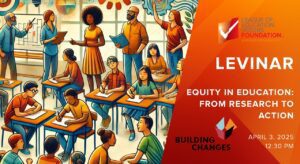 With the state legislature looking to renew its commitment to our K-12 education system, it is critical to remind policymakers that good policy is informed by data.
With the state legislature looking to renew its commitment to our K-12 education system, it is critical to remind policymakers that good policy is informed by data.
In this webinar, we explore the latest research on student homelessness in Washington state and how data-driven insights can drive meaningful policy change. This discussion highlights key research efforts and explores how they can be leveraged to create equitable educational opportunities for all students.
- Learn key findings from Building Changes’ latest K-12 report.
- Learn about the prevention work of Upstream through Chapin Hall.
- Hear from experts on bridging research and policy to address educational disparities.
Panelists:
Betsy Naymon, Senior Research Associate at Building Changes
Dr. Forrest Moore, Policy Fellow at Chapin Hall
Aaron Yared, MA, JD, Director of Policy & Advocacy at Building Changes
Neal Morton, Western Education Reporter at The Hechinger Report
Arik Korman, League of Education Voters
April 3, 2025
Archived Recording (Closed captioning is available in English, Spanish, and Somali)
Resources:
- Building Changes K-12 Education Report
- Building Changes Dashboards
- Building Changes ABC Tool
- Info on graduation waivers
- Chapin Hall Upstream Program
- Building Changes Take Action page
Washington state Teachers of the Year on Maintaining Strong and Welcoming Public Schools

Executive orders at the federal level are targeting students who are undocumented, students who identify as LBGTQ+, students who come from low-income backgrounds, and students with disabilities. Now more than ever, it is crucial to maintain strong and welcoming public schools.
In this webinar, Washington state Teachers of the Year share what they are hearing from students, families, and colleagues in their community about how the current school year is going and what students need now, especially as we face massive changes at the federal level. Students from across Washington state offer their feedback.
Panelists:
Minal Gowda, a junior at Lincoln High School in Seattle Public Schools and a member of the Association of Washington Student Leaders (AWSL)
Naomi Elsing, a junior at Lincoln High School in Seattle Public Schools and a member of the Association of Washington Student Leaders (AWSL)
Leonel Perez Valenzuela, a senior at Summit Atlas Public School in Seattle
Kim Broomer, the 2025 Washington state Teacher of the Year and Kindergarten Teacher at Ruby Bridges Elementary School in the Northshore School District, which is part of the Inclusionary Practices Technical Assistance Network (IPTN)
Jerad Koepp, the 2022 Washington state Teacher of the Year and Native Student Program Specialist at North Thurston Public Schools
Brooke Brown, the 2021 Washington state Teacher of the Year, Instructional Equity Specialist at Franklin Pierce Schools, and Board Member of the Washington State Board of Education
Amy Campbell, the 2020 Washington state Teacher of the Year, special education teacher at Helen Baller Elementary School in the Camas School District, and Board Member of the Washington State Professional Educator Standards Board
Mandy Manning, the 2018 Washington state Teacher of the Year, the 2018 National Teacher of the Year, and Digital Content Specialist for the Washington Education Association
Lyon Terry, the 2015 Washington state Teacher of the Year and Principal at Midway Elementary School in Highline Public Schools
Arik Korman, League of Education Voters
March 27, 2025
Archived Recording (Closed captioning is available in English, Spanish, and Somali) | AI Summary
Supporting LGBTQ+ Students in Schools: Advocacy and Policy Updates
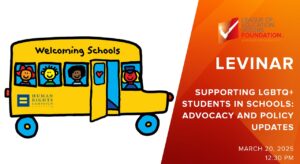 Students and families who identify as LGBTQ+ are facing challenges in schools, but there are ways we can all step up to support them. In this webinar, we discuss how to create safe, affirming, and inclusive learning environments for LGBTQ+ students.
Students and families who identify as LGBTQ+ are facing challenges in schools, but there are ways we can all step up to support them. In this webinar, we discuss how to create safe, affirming, and inclusive learning environments for LGBTQ+ students.
This session provides:
- Practical strategies to support LGBTQ+ students and families
- Insights on the latest executive orders and policy changes impacting schools
- Resources for educators, administrators, and community advocates
Now more than ever, our students need strong allies in their schools and communities. Panelists from across Washington state share best practices and tools to support our students.
Panelists:
Colleen Melody, Wing Luke Civil Rights Division Chief at the Office of Washington State Attorney General Nick Brown
Felisciana Peralta, Executive Director of Equity in Education at the Puget Sound Educational Service District
Taylor Farley, Executive Director of Queer Power Alliance
Gabriel Neuman, Policy Counsel & Government Relations Manager at GSBA, Washington State’s LGBTQ+ & Allied Chamber of Commerce
Arik Korman, League of Education Voters
March 20, 2025
Archived Recording (Closed captioning is available in English, Spanish, and Somali)
- Washington State Attorney General’s Civil Rights Resource Guide
- Resources from the Puget Sound Educational Service District
- GSBA Scholarship Fund
- Resources from the Washington State LGBTQ Commission
- Lavender Rights Project
- Gender Justice League
- Traction
How to Support Washington state’s Undocumented / Mixed Status Students and Families in Schools
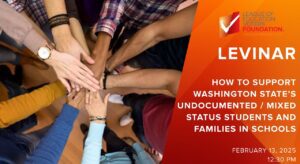 In a time of heightened xenophobia, anti-immigrant rhetoric, and threats of mass deportations, we must create safe schools for students who are undocumented or come from families with mixed status.
In a time of heightened xenophobia, anti-immigrant rhetoric, and threats of mass deportations, we must create safe schools for students who are undocumented or come from families with mixed status.
In this webinar, immigration experts and advocates discuss which immigration laws, executive orders, and revoked memos are impacting students and families who are undocumented / mixed status and which measures school boards and schools can take to protect our students.
Panelists:
Malou Chávez, Executive Director of the Northwest Immigrant Rights Project
Kathy Mulkerin, Electoral Pipeline Manager at OneAmerica
Angelica Alvarez, Director of Student and Family-Centered Improvement Initiatives at the Puget Sound Educational Service District
Abby Chien, Associate Director of Strategy and Partnerships at the Washington Student Achievement Council
Eric Holzapfel, League of Education Voters
Arik Korman, League of Education Voters
February 13, 2025
Archived Recording (Closed captioning is available in English, Spanish, and Somali)
- Know Your Rights (from Northwest Immigrant Rights Project)
- WSAC Statement on Financial Aid Applicant Privacy:
- School district policies:
Leveraging ERDC Data Dashboards for Decision-Making
The Washington State Education Research and Data Center (ERDC) has been working with college and workforce outcomes data for high school graduates to better understand what pathways students pursue after high school. These dashboards can provide useful information to schools and districts to support their programs and assist students in planning their future pathways.
In this webinar, the ERDC provides an overview of their dashboards and an overview of the High School Graduate Outcomes dashboard. Representatives from two school districts share how they use the ERDC high school outcomes data to inform their work with students.
Panelists:
Katie Weaver Randall, Director of the Washington State Education Research and Data Center
Danielle Fumia, Ph.D., Senior Data Scientist at the Washington State Education Research and Data Center
Susan Rose, Ph.D., NBCT, Assistant Principal, Quincy High School at Quincy School District
Dan Gallagher, Director of Secondary Academic Programs & Career and Technical Education at Shoreline School District
Arik Korman, League of Education Voters
January 23, 2025
Archived Recording (Closed captioning is available in English, Spanish, and Somali) | Quincy School District Presentation Slides | Shoreline School District Presentation Slides
What to Expect in the 2025 Legislative Session
During the 2025 Washington state legislative session, we must focus on community-driven solutions to support students and families who have been historically and systemically underserved – including students of color, students living in poverty, students receiving special education services and students with disabilities, students learning English, students who identify as LGBTQ+, students experiencing homelessness, and students impacted by trauma. Together, we can work to create the conditions for meaningful change and build better systems for the future of Washington students and families.
In this webinar, League of Education Voters Chief Policy Officer Jacob Vela and government relations consultant Carey Morris, along with LEV partners, give an overview of the 2025 legislative landscape, outline priorities for the 2025 legislative session, and answer your questions.
Panelists:
Vindhya Adamala and Ashlye Triebs of the Washington State Legislative Youth Advisory Council (LYAC)
Chetan Soni, Board President of the Washington Youth Alliance
Aaron Yared, Director of Policy & Advocacy at Building Changes
Emma Scalzo, Executive Director of the Balance Our Tax Code Coalition
Ben Mitchell, Director of Policy & Advocacy at the Foundation for Tacoma Students
Chris Korsmo, Executive Director of the Washington State Charter Schools Association
Carey Morris, Government Relations Consultant
Jacob Vela, League of Education Voters
Arik Korman, League of Education Voters
Resources:
- Washington state Legislature homepage
- Washington LYAC February 2nd Action Day RSVP link: https://forms.gle/JJmDefNJ353WXHP88
- Washington LYAC presentation slides
- Foundation for Tacoma Students presentation slides
- League of Education Voters Bill Tracker
- League of Education Voters Youth Advocacy Hub
January 9, 2025
Archived Recording (Closed captioning is available in English, Spanish, and Somali)
The Collaborative Process to Learn about Dual Credit in Washington state
* The Collaborative Process to Learn about Dual Credit in WA – presented by ERDC
* Using Data to Redesign Dual Credit Programs to Expand Opportunities – Panel discussion with UW Tacoma student Ashley Ramirez, Rep. Dave Paul, and Dr. Bish Paul
Over the last several years, the Washington State Education Research and Data Center (ERDC) has reported on dual credit/dual enrollment in Washington state based on requests from legislators, state agencies, researchers, local districts, and postsecondary institutions. Answering questions related to dual credit has been complicated, and ERDC has recently utilized a cross-sector workgroup to better understand the available data and guide this work.
In this webinar, we describe the workgroup process that ERDC uses and provide an overview of some of the key findings of the dual credit portfolio so far. Members of the Dual Credit Workgroup share their experience with this process and how the data it produces impacts their sectors, and we hear from a student about their experience with dual credit programs.
Panelists:
Ashley Ramirez, a student at the University of Washington, Tacoma
Katie Weaver Randall, Director of the Washington State Education Research and Data Center
Liz Dehlbom, Senior Data Scientist at the Washington State Education Research and Data Center
Dr. Dave Paul, Washington state Representative
Dr. Bish Paul, Senior Program Officer at the Bill & Melinda Gates Foundation and member of the Dual Credit Workgroup
Arik Korman, League of Education Voters
November 14, 2024
Archived Recording (Closed captioning is available in English, Spanish, and Somali) | Presentation Slides
Education and Workforce Outcomes of Students Who Have Experienced Foster Care, Homelessness, or Institutional Education
The Washington State Education Research and Data Center (ERDC) follows multiple cohorts of 8th graders who attended Washington public schools and examined K-12 school mobility and high school completion, postsecondary enrollment and completion, apprenticeship participation and completion, as well as employment and earnings over several years.
In this webinar, members of the Project Education Impact workgroup discuss how that data has informed their work.
Panelists:
Katie Weaver Randall, Director of the Washington State Education Research and Data Center
Heather McCabe, Research Scientist at the Washington State Education Research and Data Center
Cierra Draper-West, M.S.W., LSWAIC, University of Washington Champions Program, Lead Counseling Services Coordinator, Office of Minority Affairs and Diversity
Melissa Rapp, M.S.W., University of Washington Champions Program, Director, Office of Minority Affairs and Diversity
Dawn Cypriano-McAferty, Assistant Director for Passport to Careers at Washington Student Achievement Council (WSAC)
Arik Korman, League of Education Voters
October 31, 2024
Archived Recording (Closed captioning is available in English, Spanish, and Somali) | Presentation Slides
Impacts of the 2024 Washington state Ballot Initiatives

The November general election is only weeks away, and four initiatives are on the statewide ballot:
- I-2109 would repeal Washington state’s limited capital gains excise tax, slashing over $2.2 billion from public education, childcare, and early learning in the next 5 years.
- I-2117 would repeal Washington state’s cap-and-invest program and endanger our health and safety, and devastate our transportation system.
- I-2124 would eliminate Washington state’s long-term care insurance program for 3.9 million working Washingtonians, which will hurt women and increase our costs and medical debt.
- I-2066 would attack energy efficiency by repealing common-sense protections, leaving us with higher energy costs and making our communities more vulnerable during storms, wildfires, and deadly heat waves.
In this webinar, we explore the impacts of what would happen if these initiatives were to pass and answer your questions.
Panelists:
Monica Jurado Stonier, Washington state Representative
Treasure Mackley, Executive Director of Invest in Washington Now
Christina Keys, an advocate for family caregivers in Vancouver
Calvin Jones, Outreach Director at Defend Washington
Carey Morris, Government Relations Consultant
Arik Korman, League of Education Voters
October 17, 2024
Archived Recording (Closed captioning is available in English, Spanish, and Somali)| Presentation Slides on I-2109| Presentation Slides on I-2066
Washington’s Response to Student Mental Health
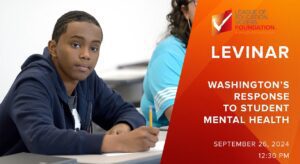
As students have returned to schools across Washington in recent weeks, student mental health remains a priority for many students and educators as they begin a new year. In a recently released report, League of Education Voters (LEV) identified the challenges school districts face in supporting the mental health needs of students and the importance of supporting student mental health so that students can be ready to learn.
In this webinar, we discuss barriers that schools and students experience in accessing and providing mental health support, what is being done to prepare educators to support students through crisis, and challenges faced when schools prioritize the mental health of students. We bring together students, practitioners, and community-based organization partners from across the state to share their experiences.
Panelists:
Mikey Jolley Jr., a senior at Three Springs High School in the Cheney School District
Travis Weese, Counselor at Three Springs High School in the Cheney School District
Zachary Stowell, Principal of Robert Eagle Staff Middle School in Seattle Public Schools
Dr. David Crump, Director of Mental Health Services at Spokane Public Schools
Daniel Perez, Director of School Partnerships at Seneca Family of Agencies
Arik Korman, League of Education Voters
September 26, 2024
Archived Recording (Closed captioning is available in English, Spanish, and Somali)
What Values and Goals Should Provide the Foundation of Our Education System?
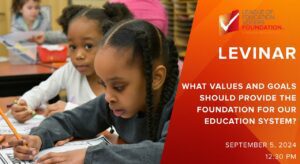
In a recently released report, League of Education Voters (LEV) identified the need to have clear values, goals, and expectations for our K-12 system, which must be aligned with how we structure and fund our education system.
Our K-12 education system plays a critical role in communities across Washington – a role that is continuing to evolve to meet the needs of students. As more is being asked of schools and as students need a broader range of support, it brings up some important questions about how we design and resource our K-12 education system.
In this webinar, we explore these themes with students, families, practitioners, and other community leaders. Join us for a discussion to identify the values and goals that should provide the foundation for our K-12 education system. If we are going to provide an education where every student feels supported, valued, and has a positive sense of belonging, what values, goals, and expectations do we need to have reflected in our K-12 system?
Panelists:
Abby Wu, a junior at Pullman High School in the Pullman School District
Devol Yokley-Griffin, a senior at Cheney High School in the Cheney School District
Chelsea Opiyo, a junior at Cheney High School in the Cheney School District
Maricela Chavez, a parent of two children in 4th grade and 11th grade in the Franklin Pierce School District and an alumna of the Parent Ambassadors program through the Washington State Association of Head Start & ECEAP
Daree Blake, a parent of 5 children in the Central Valley School District in Spokane Valley and an alumna of the Parent Ambassadors program through the Washington State Association of Head Start & ECEAP. This year, her children will be in 4th, 7th, 9th and 12th grade, along with a recent graduate
Blaire Penry, the 2024 Washington state Teacher of the Year who teaches Career & Technical Education (CTE) programs and fine arts for grades 6 through 12 for the Auburn School District
Larry Quisano, Director of Recruitment and Workforce Diversity for Spokane Public Schools
Kelly Niccolls, Director of Teaching and Learning, Curriculum & Instruction for Cheney Public Schools
Justin Hendrickson, Professional Growth and Educator Support (PGES) and Principal Association of Seattle Schools (PASS) Principal Coach NW Region for Seattle Public Schools
Arik Korman, League of Education Voters
September 5, 2024
Archived Recording (Closed captioning is available in English, Spanish, and Somali)
The State of Equitable Education Funding in Washington
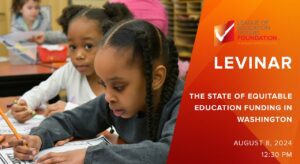
We are weeks away from the start of a new school year. Educators are busy preparing for their new students, students are enjoying the last weeks of the summer break, and families are looking forward to leaving the childcare challenges of the summer behind. However, there is an undercurrent of concern from many as the upcoming school year will look different for students, families, and educators in many districts as they have had to make some difficult decisions in response to the budget crises that have been amplified by the drying up of one-time federal stimulus funding.
In this webinar, League of Education Voters Chief Policy Officer Jacob Vela shares the findings and recommendations from our new report on the landscape of K-12 funding in Washington state, which was informed through in-depth interviews with school district superintendents and finance officers from across Washington. We discuss challenges in our current K-12 funding approach and how the approach of districts to meeting student needs has shifted in recent years.
Panelists:
Jacob Vela, League of Education Voters
Arik Korman, League of Education Voters
August 8, 2024
Archived Recording (Closed captioning is available in English, Spanish, and Somali) | Summer 2024 Education Funding Report | Presentation Slides
The Role of Artificial Intelligence in Education
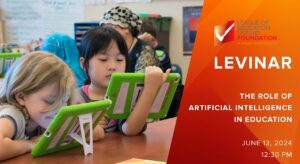
Earlier this year, Washington became the fifth state in the country to issue guidance on using Artificial Intelligence (AI) in schools. Teachers across the state are starting to incorporate AI in the classroom and in their work, now that educators are being encouraged to embrace this new, ever-evolving technology.
In this webinar, we define what AI is, explore the pros and cons of AI in the classroom, and discuss how AI will change the skills that students need to be relevant in the workforce.
Panelists:
Ruslan Mukhamedvaleev, a sophomore from Kamiak High School in the Mukilteo School District and a member of the Washington state Legislative Youth Advisory Council (LYAC)
Jeff Utecht, Educator, Consultant, and Author, who consults the Washington state Office of the Superintendent of Public Instruction (OSPI) on Artificial Intelligence
Jolenta Coleman-Bush, Senior Program Manager at Microsoft Philanthropies
Adam Aguilera, Language Arts Teacher at Shahala Middle School in Evergreen Public Schools in Vancouver and Chair of the Washington state Professional Educator Standards Board
Cassondra Smith, Educational Technology Coordinator at Battle Ground Public Schools
Travis Rush, Education Technology Lead at the Washington Association of Educational Service Districts (AESD) and Board Member in the Eatonville School District
Dr. Min Sun, Professor at the University of Washington College of Education who specializes in teacher learning and artificial intelligence/machine learning research
Arik Korman, League of Education Voters
Resources:
- Gen AI and the future of work
- Future of Work Report
- OSPI Guidelines on Human-Centered Artificial Intelligence in Schools
- 5 Step Scaffolding Scale for Students
- What do AI chatbots really mean for students and cheating?
- Colleague: An AI Assistant to Empower K-12 Teachers for High-Quality, Personalized Teaching and Learning
- A free guide about reimagining the egg drop with AI
- WAESD AI Summit in October 2024
June 13, 2024
Archived Recording (Closed captioning is available in English, Spanish, and Somali)
Addressing the Impact of the Opioid Crisis on Washington Schools and Communities
Washington state had the nation’s largest increase of overdose deaths between 2022-23, a 28% increase — totaling 3,024 deaths, with the vast majority coming from opioids and synthetic opioids such as fentanyl.
In this webinar, we hear from a statewide panel on the scale and impact of the opioid crisis on our communities and schools, legislation that came out of the 2024 Washington state Legislative Session to tackle deaths, how this legislation will be implemented, and how local communities and tribes are working with their government and healthcare agencies, as well as schools, to combat this epidemic.
Panelists:
Genavieve (Gigi) Gamache, a sophomore at Selah High School in the Selah School District and a member of HOSA Future Health Professionals
Sophia Tyrrell, a sophomore at Selah High School in the Selah School District and a member of HOSA Future Health Professionals
Washington state Representative Mari Leavitt (D-28), prime sponsor of House Bill 1956 addressing fentanyl and other substance use prevention education
Thea Oliphant-Wells, Harm Reduction and Fentanyl Testing Program Manager at Public Health – Seattle & King County
Arik Korman, League of Education Voters
May 23, 2024
Archived Recording (Closed captioning is available in English, Spanish, and Somali)
Do Smartphones Belong in K-12 Classrooms?
Smartphone bans in K-12 schools are part of a growing trend. The U.S. Surgeon General has issued an advisory sounding the alarm about social media and youth mental health. And UNESCO — the United Nations education, science, and culture agency — has recently come out urging a ban on cell phones in schools globally.
In this webinar, we explore the impact of smartphones on student mental health, learn from a school district in Washington state that has enacted a smartphone ban, and answer your questions.
Panelists:
Maria De Luna, a student at Bethel Virtual Academy in the Bethel School District and a member of the Association of Washington Student Leaders (AWSL)
Pradyu Kandala, a student at Eastlake High School in the Lake Washington School District and a member of the Association of Washington Student Leaders (AWSL)
Brooke Brown, the 2021 Washington state Teacher of the Year, member of the Washington State Board of Education, and an Instructional Equity Specialist at the Franklin Pierce School District
Susie Honaker Wirzbicki, School Counselor and Educator at Cedar High School in the Shelton School District and Co-Chair of the Washington School Counselor Association‘s Ethics Committee
Kelsey Parke, Principal at Kopachuck Middle School in the Peninsula School District
Kris Hagel, Executive Director of Learning and Innovation at the Peninsula School District
Dr. Lucía Magis-Weinberg, Assistant Professor in Psychology at the University of Washington and leader of the interACTlab (International Adolescent Connection and Technology Laboratory)
Arik Korman, League of Education Voters
Resources:
May 2, 2024
Archived Recording (Closed captioning is available in English, Spanish, and Somali)
How Our Institutions Are Accommodating and Navigating the Delay in Higher Education Financial Aid for 2024
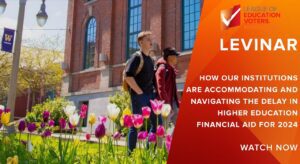
Many higher education schools rely on the Free Application for Federal Student Aid, or FAFSA, to help them determine how much of their institutional money to give out in the form of grants that students will not have to repay. Unfortunately, the troubled federal rollout of the new FAFSA form — and the revision of the formula for determining who gets federal financial aid — means that any attempt to offer a price quote to current or recently admitted students may be just a rough estimate.
In this webinar, we discuss steps that Washington state institutions are taking to help students cope with the financial aid delays and how students and families can navigate the current situation.
Panelists:
Sam Alvarado (he/they/she), a junior at Moses Lake High School in the Moses Lake School District and a member of the Association of Washington Student Leaders (AWSL)
Athaliah Ioane (she/her), a sophomore at Whitworth University double majoring in Political Science and Communications – Journalism and a member of the Washington Student Engagement Networks
Rebecca Tibbetts (she/her), a graduate of Walla Walla Community College with a Bachelor of Applied Science in Business Management who is now working on a Master of Arts in Higher Education Student Affairs at Grand Canyon University, the Columbia Regional Coordinator for the Washington Student Engagement Networks, and the Food Pantry Coordinator at Walla Walla Community College
Ruben Flores, Executive Director at the Council of Presidents
Dr. Terri Standish-Kuon, President & CEO at Independent Colleges of Washington
Becky Thompson, Director of Student Financial Assistance at the Washington Student Achievement Council (WSAC)
Dr. Joyce D. Hammer, Deputy Executive Director for Education at the Washington State Board for Community and Technical Colleges
Arik Korman, League of Education Voters
Resources:
- Link to the Free Application for Federal Student Aid (FAFSA): https://studentaid.gov/apply-for-aid/fafsa/filling-out
- More FAFSA resources: www.WAgrant.org/fafsa (English), www.WAgrant.org/fafsa-es (Spanish)
- 2024-25 FAFSA updates from the Washington Student Achievement Council: https://wsac.wa.gov/2024-25-FAFSA-Updates
- Information on the WASFA: https://wsac.wa.gov/wasfa
- Washington College Grant – ESPAÑOL: https://wsac.wa.gov/wcg-es
- Financial Aid Information & Filing Events: https://wsac.wa.gov/financial-aid-events
- More information on Aim Higher including digital resources, outreach and event info: https://wsac.wa.gov/aim-higher
- OtterBot for students and Parents/ guardians: https://wsac.wa.gov/otterbot
- If all the different resources from WSAC seem a bit overwhelming, which we know can be sometimes, the one link that you should save is this, which can then take you to all other resources: https://wsac.wa.gov/fa-toolkit
- Washington’s Public Four-Year College and Universities Extend College Decision Day: https://councilofpresidents.org/2024/02/23/washingtons-public-four-year-college-and-universities-extend-college-decision-day
- Washington community and technical colleges contact list: https://www.sbctc.edu/our-colleges/college-contact-list
- Contact information for financial aid offices at Gonzaga University, Heritage University, Pacific Lutheran University, Saint Martin’s University, Seattle Pacific University, Seattle University, University of Puget Sound, Whitman College, and Whitworth University: https://icwashington.org/page/financialaid
- For the latest from Independent Colleges of Washington’s (ICW) member campuses regarding acceptance deadlines and how we are working to support prospective and returning students: https://icwashington.org/page/FAFSA2024
- Here’s the latest from ICW’s member campuses regarding acceptance deadlines and how we are working to support prospective and returning students:
- Awarding financial aid packages to admitted students based on information other than the FAFSA: Whitman College
- Extending to June 1 the deadline for admitted students to make a commitment to enroll: Gonzaga University, Pacific Lutheran University, Saint Martin’s University, Seattle Pacific University, Seattle University, University of Puget Sound, and Whitworth University
- Accepting enrollment decisions on a rolling basis until the later summer: Heritage University
March 28, 2024
Archived Recording (Closed captioning is available in English, Spanish, and Somali)
2024 Legislative Session Recap: What Washington Students Got and Next Steps
To wrap up the 2024 Legislative Session, League of Education Voters Interim Co-CEO / Director of Policy and Research Jacob Vela, government relations consultant Carey Morris, and LEV partners provide an overview of what happened in Olympia, along with status updates on LEV’s 2024 Legislative Platform:
- Create safe and inclusive learning environments
- Provide comprehensive supports for wellness and inclusion at school
- Support students receiving special education services
- Establish equitable funding structures
In this webinar, they also answer your questions and let you know what we can do to prepare for the upcoming session in 2025.
Panelists:
Ashlye Triebs, a junior at Columbia River High School in Vancouver Public Schools, a full-time running start student at Clark College, and a member of the Washington state Legislative Youth Advisory Council (LYAC)
Roxana Gomez, Youth Policy Program Director at ACLU Washington
Yordanos Gebreamlak, Deputy Director in the Washington State Governor’s Office of the Education Ombuds
Allison Krutsinger, Director of Public Affairs at the Washington State Department of Children, Youth, and Families
Stacy Dym, Executive Director of The Arc of Washington State
Sunshine Cheng, Public Policy Liaison at Disability Rights Washington
Jayme Shoun, Policy Director at Washington STEM
Carey Morris, Government Relations Consultant
Jacob Vela, League of Education Voters
Arik Korman, League of Education Voters
March 14, 2024
Archived Recording (Closed captioning is available in English, Spanish, and Somali) | LEV 2024 Supplemental Budget Summary
How to Expand Access to Higher Education Through the College Promise Model
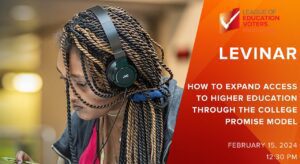
Washington is one of the top ten states for career opportunities that require education beyond high school. But only 40 percent of Washington students are currently projected to earn a postsecondary credential. How can we help more students obtain the education they need?
In this webinar, we discuss how we can prioritize limited state resources to expand access to higher education, how the College Promise model works, and what House Bill 2309 establishing the Washington 13 free guarantee would do.
Panelists:
Clara Stickney, a junior at Hanford High School in the Richland School District and a member of the Association of Washington Student Leaders (AWSL)
Washington state Representative Steve Bergquist (D-11)
Lauren Mendez, Chief Executive Officer at the Washington School Counselor Association
Ben Mitchell, Director of Advocacy & Policy at the Foundation for Tacoma Students
Arik Korman, League of Education Voters
February 15, 2024
Archived Recording (Closed captioning is available in English, Spanish, and Somali)
Ensuring Fair Due Process in Special Education
When a parent or guardian doesn’t agree with a decision a school has made about their child’s special education services, they can request a due process hearing. This is a legal proceeding that helps determine whether or not the decision made is appropriate. However, in our state, the burden of proof (or responsibility) is placed on parents/guardians to prove their case, rather than on the school to defend their decision.
Proving the facts in a due process hearing can be an expensive and time-consuming process for families, which may include hiring lawyers or experts to be able to make a case. This puts parents/guardians without a lot of resources at a great disadvantage. Caregivers who don’t speak or read English or who face other communication barriers are also disadvantaged. For the student, it jeopardizes an important accountability check. If their Individualized Educational Program (IEP) isn’t right – or if they were incorrectly denied one – they can’t access education. Due process helps ensure the process works for kids.
In this webinar, we discuss why we must switch the burden of proof to school districts. This means that school districts would need to submit their data and reasoning about the student’s IEP to the court for review.
Panelists:
Washington state Senator Yasmin Trudeau (D-27)
Kathy George, Partner at Johnston George LLP, a Northwest law Firm
Karen Pillar, Director of Policy and Advocacy at TeamChild
Andrea Kadlec, Attorney at Disability Rights Washington
Arik Korman, League of Education Voters
January 25, 2024
Archived Recording (Closed captioning is available in English, Spanish, and Somali)
What to Expect in the 2024 Legislative Session
During the 2024 Washington state legislative session, we must focus on community-driven solutions to support students and families who have been historically and systemically underserved – including students of color, students living in poverty, students receiving special education services and students with disabilities, students learning English, students who identify as LGBTQ+, students experiencing homelessness, and students impacted by trauma. Together, we can work to create the conditions for meaningful change and build better systems for the future of Washington students and families.
In this webinar, League of Education Voters Co-CEO / Director of Policy and Research Jacob Vela and government relations consultant Carey Morris, along with LEV partners, give an overview of the 2024 legislative landscape, outline our priorities for the 2024 legislative session, and answer your questions.
Panelists:
Stacy Osoria, a senior at Shorewood High School in Shoreline Public Schools and a member of the Washington state Legislative Youth Advisory Council (LYAC)
Chetan Soni, a senior at Lincoln High School in Seattle Public Schools, a Running Start student, Founder and Executive Director of the Washington Youth Alliance, and Operations Coordinator at the Alliance for Gun Responsibility
Roxana Gomez, Youth Policy Program Director at ACLU Washington
Ramona Hattendorf, Director of Public Policy & Civic Engagement at The Arc of King County
Ben Mitchell, Director of Advocacy & Policy at the Foundation for Tacoma Students
Carey Morris, Government Relations Consultant
Jacob Vela, League of Education Voters
Arik Korman, League of Education Voters
Resources:
- Washington state Legislature homepage
- Bills that were mentioned in the webinar: HB 1479, HB 1741, HB 1178 (SB 5446), HB 1902, HB 2054, HB 2058 (SB 5964), SB 5883 (HB 2121), Office of Youth Mental Health (bill # coming soon)
- ACLU WA report on the use of Isolation and Restraint in Washington state
- The Arc of Washington State’s Legislative Session Notebook
- The Arc of Washington State’s one-pager on Making Due Process in Special Education Fair
- The Arc of King County’s LEVinar presentation slides
- Graduate Tacoma’s Policy Platform
- Graduate Tacoma’s report on Accessing Higher Education Financial Aid in Washington State
January 5, 2024
Archived Recording (Closed captioning is available in English, Spanish, and Somali)
Pathways of Change: A Journey through Institutional Transformation
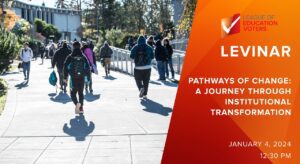
The Guided Pathways Initiative, supported by College Spark Washington, streamlines the postsecondary process from college entrance to program selection to degree completion, providing students with a much clearer, more efficient path to completion.
In this webinar, we spotlight four colleges that have made substantial change at their institutions through the implementation of Guided Pathways. Discover the driving forces behind their commitment, the innovative strategies employed, and the remarkable outcomes achieved through dedicated leadership and bold changes. Our panel of experts from these institutions share their experiences, challenges, and triumphs, offering valuable insights into student success and the future of higher education.
Moderated by League of Education Voters Interim Co-CEO / Communications Director Arik Korman.
Panelists:
Monica Wilson, Director of the Washington State Student Success Center and Strategic Initiatives at the Washington State Board for Community and Technical Colleges
Dr. Matthew Campbell, President of Pierce College
Debra Gilchrist, Vice President for Learning and Student Success at Pierce College
Dr. Kimberlee Messina, President of Spokane Falls Community College
Dr. Michelle Andreas, Vice President of Instruction at South Puget Sound Community College
Dr. Dave Pelkey, Vice President of Student Services at South Puget Sound Community College
Dr. Thomas Broxson, Vice President of Instruction at Clover Park Technical College
Bob Watrus, Independent Evaluator for College Spark and the Guided Pathways Initiative
Deena Heg, Independent Evaluator for College Spark and the Guided Pathways Initiative
Arik Korman, League of Education Voters
January 4, 2024
Archived Recording (Closed captioning is available in English, Spanish, and Somali)
Washington state Teachers of the Year on What Students Need Now
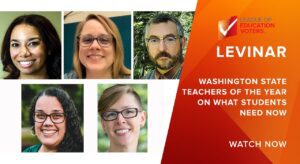
Although many policymakers at the state and federal levels seem to believe the COVID pandemic is behind us, students, families, and educators are saying that this school year is challenging.
In this webinar, Washington state Teachers of the Year share what they are hearing from students, parents, and colleagues in their community about how the current school year is going and what students need now, especially as we enter the 2024 legislative session. Students from the Washington state Legislative Youth Advisory Council (LYAC) and the new Washington Youth Alliance (WYA) offer their feedback.
Moderated by League of Education Voters Interim Co-CEO / Communications Director Arik Korman.
Panelists:
Stacy Osoria, a senior at Shorewood High School in Shoreline Public Schools and a member of the Washington state Legislative Youth Advisory Council (LYAC)
Chetan Soni, a senior at Lincoln High School in Seattle Public Schools, a Running Start student, Founder and Executive Director of the Washington Youth Alliance, and Operations Coordinator at the Alliance for Gun Responsibility
Blaire Penry, the 2024 Washington state Teacher of the Year
Dana Miles, the 2023 Washington state Teacher of the Year
Jerad Koepp, the 2022 Washington state Teacher of the Year
Brooke Brown, the 2021 Washington state Teacher of the Year
Mandy Manning, the 2018 Washington state Teacher of the Year and the 2018 National Teacher of the Year
Arik Korman, League of Education Voters
December 14, 2023
Archived Recording (Closed captioning is available in English, Spanish, and Somali)
Youth Substance Use Prevention
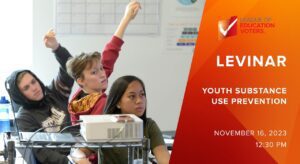
The number of Washington youths age 17 and younger who have died from an opioid overdose has tripled since 2019. A vast majority of deaths are tied to synthetic opioids, such as fentanyl. Treating youths for substance use disorders has traditionally involved various types of psychosocial interventions, like counseling, 12-step programs, and stays at residential rehabilitation facilities. But teen addiction to fentanyl is a relatively new phenomenon. How to get youth treatment is becoming an ever more urgent problem.
In this webinar, we explore how widespread youth substance use is today and share strategies for prevention.
Panelists:
Howl Hall, a senior at The Community School in Spokane Public Schools
Bhodi Asien, a sophomore at The Community School in Spokane Public Schools
Jerry Blackburn, Program Director of the Empower Youth Network
Cameron Fordmeir, Regional Administrator for the Recovery Navigator Program and Assisted Outpatient Treatment at Greater Columbia Behavioral Health
Stacey Swilley, Behavioral Health Program Manager at the Puget Sound Educational Service District
Arik Korman, League of Education Voters
November 16, 2023
Archived Recording (Closed captioning is available in English, Spanish, and Somali) | Website that Stacey Swilley referenced to order the Good Samaritan wallet cards | A free evidence-based curriculum for substance use prevention
Advancing Washington state Educator Diversity in School Districts and School Buildings
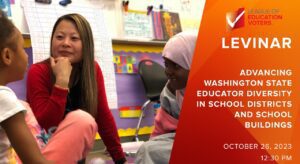
There is a significant disparity between the diversity of Washington’s students and educators. BIPOC youth make up nearly half of our student population, while nearly 90% of our teachers and education leaders are white. Studies show that BIPOC students who are exposed to teachers who reflect their race and ethnicity have higher graduation rates. And when more of the adults in schools reflect the communities they serve, it also creates deeper, more authentic school/community partnerships that have the power to transform schools in ways that dismantle racism and benefit from the wisdom and vision of families.
In this webinar, we discuss why we need to attract and retain educators of color, what we can do to position educators of color for success, and how we can work together at the school district and school building level to support and sustain a diverse education workforce in Washington state.
Panelists:
Vindhya Adamala, a junior at Olympia High School in the Olympia School District and a member of the Washington state Legislative Youth Advisory Council (LYAC)
Wyatt Santucci, a junior at Mount Spokane High School in the Mead School District and a member of the Washington state Legislative Youth Advisory Council (LYAC)
Dr. Marissa Winmill, Multi-Lingual Teacher and Global Educator Leader at Kent-Meridian High School in the Kent School District and a member of the Puget Sound Educational Service District’s Educators of Color Leadership Community
Justin Hendrickson, Principal at South Shore PreK-8 in South Seattle, where 40% of the certificated workforce are educators of color
Larry Quisano, Director of Recruitment and Workforce Diversity at Spokane Public Schools
Sung Kim, Director of the Technology Access Foundation’s Network for EdWork
Mary Beth Canty, Curriculum and Induction Senior Manager of the Seattle Teacher Residency program at the Alliance for Education
Arik Korman, League of Education Voters
October 26, 2023
Archived Recording (Closed captioning is available in English, Spanish, and Somali)
Lifesaving Skills: Youth Suicide Prevention Through Social-Emotional Learning
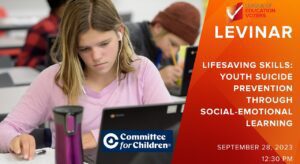
September is Suicide Prevention Month, an opportunity to reflect on our collective responsibility to prioritize mental health and well-being and implement proactive strategies to prevent youth suicide. With youth suicide rates increasing and 22% of high schoolers seriously considering suicide within the past year — up from 16% in 2011 — given the urgency of this issue, how can Washington state prioritize evidence-based investments in prevention for all young people?
Social-emotional learning is a powerful and cost-effective intervention to equip young individuals with essential skills tied to protective factors that play a pivotal role in reducing the likelihood of developing suicidal thoughts and behaviors. During this timely webinar, we share the impacts of social-emotional learning on youth suicide prevention and discuss possible pathways forward for Washington state to address this ongoing crisis.
Panelists:
Micah Fitzgerald, a senior at Richland High School in the Richland School District and a member of the Washington state Legislative Youth Advisory Council (LYAC)
Stacy Osoria, a senior at Shorewood High School in Shoreline Public Schools and a member of the Washington state Legislative Youth Advisory Council (LYAC)
Megan Reibel, Director of School-Based Programs, Forefront Suicide Prevention at the University of Washington School of Social Work
Dr. Tia Kim, Vice President of Education, Research, and Impact at Committee for Children
Jordan Posamentier, Vice President of Policy and Advocacy at Committee for Children
Arik Korman, League of Education Voters
September 28, 2023
Archived Recording (Closed captioning is available in English, Spanish, and Somali) | Presentation Slides
Washington Education Funding and School District Budget Challenges
As federal stimulus dollars start playing a smaller part in school budgets, school districts across Washington state face challenging decision points. Many districts are exploring consolidating resources and serving students with fewer staff.
In this webinar, we examine why districts are in this situation and discuss possible pathways forward at the state and local level.
Panelists:
Dr. Adam Swinyard, Superintendent of Spokane Public Schools
Dr. Kurt Buttleman, Assistant Superintendent – Finance / CFO at Seattle Public Schools
Dr. Melissa Beard, former Chief of Finance and Operations at Steilacoom Historical School District and a board member of the Tumwater School District
Dr. Tanisha Brandon-Felder, Director of Equity and Family Engagement at Shoreline Public Schools
Sarah Thornton, Assistant Superintendent at the Pasco School District
Dr. David Knight, Associate Professor of Educational Foundations, Leadership & Policy at the University of Washington College of Education
Arik Korman, League of Education Voters
June 28, 2023
Archived Recording (Closed captioning is available in English, Spanish, and Somali)
2023 Legislative Session Recap: What Washington Students Got and Next Steps
To wrap up the 2023 Legislative Session, League of Education Voters Policy Analyst Ellie Bridge, government relations consultant Carey Morris, and LEV partners provide an overview of what happened in Olympia, along with status updates on LEV’s 2023 legislative platform – Student Mental Health and Social-Emotional Wellness, Safe and Inclusive Learning Environments, Equitable Resourcing Structures Centered on Student Need, and Students Receiving Special Education Services and Students with Disabilities are General Education Students First and Must be Supported and Included. They also answer your questions and let you know what we can do to prepare for the upcoming session in 2024.
Panelists:
Hiro Hirano-Holcomb, a junior at Glacier Peak High School in the Snohomish School District and a first-year member of the Washington state Youth Advisory Council (LYAC)
Larry Quisano, principal of Frances Scott Elementary School in Spokane
Sara Betnel, Director of District 5 and Legislative Representative, Shoreline School District Board
Paula Sardinas, President and CEO of FMS Global Strategies LLC, a Black and other BIPOC Governmental Affairs Advocacy firm
David Beard, Principal Owner at Anchor Collaborative Strategies
Andrea Kadlec, Attorney at Disability Rights Washington
Carey Morris, Government Relations Consultant
Ellie Bridge, League of Education Voters
Arik Korman, League of Education Voters
May 11, 2023
Archived Recording (Closed captioning is available in English, Spanish, and Somali) | LEV 2023-25 Biennial Budget Summary | WSSDA Special Education Funding Dashboard
Under the Radar Budget Provisos that Can Make a Difference for Washington’s Young People
The budget proposals currently being discussed in Olympia will determine which programs will be funded and to what level for the next two years. More cost-intensive proposals often get the headlines, but budgets also include dozens of smaller items that often go unnoticed, but they can help usher in meaningful change.
In this webinar, we take a closer look at a few potentially impactful budget provisos that advocates are hoping to secure funding for as the legislature settles into the budget negotiation process.
Panelists:
Roxana Gomez, Youth Policy Manager at The ACLU of Washington
Kia Franklin, Executive Director of Stand for Children Washington
Paula Sardinas, President and CEO of FMS Global Strategies LLC, a Black and other BIPOC Governmental Affairs Advocacy firm
Sarah Butcher, Co-Founder and Director at Roots of Inclusion
Ramona Hattendorf, Director of Advocacy at The Arc of King County
Arik Korman, League of Education Voters
April 6, 2023
Archived Recording (Closed captioning is available in English, Spanish, and Somali)
Nothing About Us Without Us
People with direct lived experience have a knowledge and understanding of how systems and policies operate that is often not part of the policymaking process. It is critical that we meaningfully include people from underserved populations who have direct, lived experience with policy issues when we are working to improve how policies serve communities.
In this webinar, we discuss House Bill 1541, The Nothing About Us Without Us Act. We address why we need HB 1541, what HB 1541 would do, and what we can do to help HB 1541 become law.
Panelists:
Washington state Representative Darya Farivar, prime sponsor of House Bill 1541
Jeremiah Audet, a sophomore at Rogers High School in Spokane Public Schools who is a member of the Student Potential Youth Advisory Council (SPYAC)
Sunshine Cheng, Cross-Disability Advocacy Network Coordinator at Disability Rights Washington
Eric Matthes, Community Advocacy Coordinator at The Arc of King County
Kristin DiBiase, Associate Dean for Student Affairs at Seattle University School of Law
Ivanova Smith, Activist Advocate for AtWork!
Courtney Thom, board member of People First of Washington, President of the Lewis County Chapter of Self Advocates in Leadership (SAIL), and an officer on the National Council of Self Advocates (NCSA)
Laura Van Tosh, coordinator of the Mental Health Policy Roundtable, a member of the disability community, and a leader in the psychiatric disability community
Arik Korman, League of Education Voters
March 23, 2023
Archived Recording (Closed captioning is available in English, Spanish, and Somali)
The Special Education Funding Cap
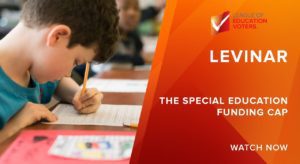
School districts receive both state and federal funding to provide educational services and supports to students with disabilities. In Washington, the state provides the biggest portion of funding for special education, but the state currently caps funding for school districts at 13.5% of their student population, even if more than 13.5% of students receive special education services. However, districts are still required by state and federal law to provide special education services to all students with a qualifying disability.
In this webinar, we explain what the special education funding cap is, how many school districts are impacted, and why eliminating the cap is important.
Panelists:
Jeremiah Audet, a sophomore at Rogers High School in Spokane Public Schools who is a member of the Student Potential Youth Advisory Council (SPYAC)
Dr. Tania May, Assistant Superintendent of Special Education Services at the Washington state Office of the Superintendent of Public Instruction (OSPI)
Dr. Cassie Martin, Executive Director of Special Education at the Washington state Office of the Superintendent of Public Instruction (OSPI)
Nikki Otero Lockwood, Vice President of the Spokane Public Schools Board of Directors
Matt Hill, Senior Director of Special Services at Evergreen Public Schools in Vancouver
Peter Musante, Public Policy Analyst at Open Doors for Multicultural Families
Washington state Senator John Braun, prime sponsor of Senate Bill 5511, which would raise the special education funding cap to 15%
Arik Korman, League of Education Voters
February 16, 2023
Archived Recording (Closed captioning is available in English, Spanish, and Somali) | OSPI Presentation Slides | Issue Brief: What Is the Special Education Funding Cap? | Issue Brief: Special Education Funding
Ending Isolation Practices in Washington K-12 Schools
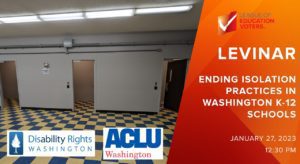 Isolating students in schools creates harm that is lifelong and disabling.
Isolating students in schools creates harm that is lifelong and disabling.
In this webinar, we spotlight findings from a new ACLU/Disability Rights Washington report and an Office of the Superintendent of Public Instruction (OSPI)-led legislative workgroup report on isolation and restraint practices in Washington state and discuss the impacts of isolation in K-12 schools, why this practice must end, and alternatives to isolation.
Panelists:
Mina Barahimi Martin, Policy Analyst at The ACLU of Washington
Andrea Kadlec, Attorney at Disability Rights Washington
Eric Warwick (she/her), Community Advocacy Coordinator at The Arc of King County who experienced restraint and isolation as a special education student and has worked as a paraeducator
Lee Collyer, Director of School Health and Student Safety at the Washington Office of Superintendent of Public Instruction (OSPI)
Nikki Otero Lockwood, Vice President of the Spokane Public Schools Board of Directors
Kayla Korves-Bishop, Special Education Teacher at South Shore PreK-8 in Seattle Public Schools
Lulu Ramadan, Investigative Reporter at The Seattle Times and a distinguished fellow with ProPublica‘s Local Reporting Network
Arik Korman, League of Education Voters
January 27, 2023
Archived Recording (Closed captioning is available in English, Spanish, and Somali) | ACLU WA Presentation Slides | OSPI Presentation Slides | ACLU/Disability Rights WA Report | Legislative Workgroup Report
What to Expect in the 2023 Legislative Session
During the 2023 Legislative Session, we must focus on community-driven solutions to support students and families who have been historically and systemically underserved – including students of color, students in poverty, students receiving special education services and students with disabilities, students learning English, students experiencing homelessness, and students impacted by trauma. We must use this moment as an opportunity to create meaningful and lasting change.
In this webinar, League of Education Voters Director of Policy and Research Jacob Vela and government relations consultant Carey Morris, along with LEV partners, give an overview of the 2023 legislative landscape, outline priorities for the 2023 legislative session, and answer questions.
Panelists:
Shreya Shaji, a senior at North Creek High School in the Northshore School District and Legislative Affairs Director of the Washington state Legislative Youth Advisory Council (LYAC)
Maanit Goel, a junior at Eastlake High School in the Lake Washington School District and a member of the Washington state Legislative Youth Advisory Council (LYAC)
Andrea Kadlec, Attorney for Disability Rights Washington
Jordan Posamentier, Vice President of Policy & Advocacy for Committee for Children
Carey Morris, Government Relations Consultant
Jacob Vela, League of Education Voters
Arik Korman, League of Education Voters
January 5, 2023
Archived Recording (Closed captioning is available in English, Spanish, and Somali)
Advancing Washington state Educator Diversity in the 2023 Legislative Session
There is a significant disparity between the diversity of Washington’s students and educators. BIPOC youth make up nearly half of our student population, while nearly 90% of our teachers and education leaders are white. Studies show that BIPOC students who are exposed to teachers who reflect their race and ethnicity have higher graduation rates. And when more of the adults in schools reflect the communities they serve, it also creates deeper, more authentic school/community partnerships that have the power to transform schools in ways that dismantle racism and benefit from the wisdom and vision of families.
In this webinar, we discuss the Washington state Office of the Superintendent of Public Instruction’s legislative priority of attracting and retaining educators of color, especially what policies we need to support to position educators of color for success, what more is needed, why so many educators have left Washington schools, and how can we work together to support and sustain a diverse education workforce in Washington state.
Moderated by League of Education Voters Communications Director Arik Korman.
Panelists:
Laurel Lakoundji, a sophomore at Western Washington University and a member of The Root of Our Youth
Damaris Ibrahim, a freshman at Pacific Lutheran University and a member of The Root of Our Youth
Jonathan Kwong, a junior at the University of Washington and a member of The Root of Our Youth
Angela Ituarte, a sophomore at Central Kitsap High School and a member of The Root of Our Youth
Eileen Yoshina, Director of Equity in Education at the Puget Sound Educational Service District and facilitator of the Educators of Color Leadership Community
Maria Esther Zamora, creator of the Spokane Future Teachers of Color Consortium
Dr. Stacey Hardin, Assistant Dean for Teacher Preparation at the University of Washington College of Education
Jacob Vela, Director of Policy and Research, League of Education Voters
Arik Korman, League of Education Voters
December 7, 2022
Archived Recording (Closed captioning is available in English, Spanish, and Somali) | Presentation Slides
A Discussion about Critical Race Theory in K-12 Classrooms
Scholars of color developed Critical Race Theory (CRT) during the 1970s and 1980s in response to a lack of racial progress following the civil rights legislation of the 1960s. The central idea of Critical Race Theory is that racism is institutionalized and is embedded in U.S. history, legal systems, and policies. It acknowledges the continuing impacts of racial hierarchies and white dominance in America and critiques how institutionalized racism perpetuates power relations that are inherently unequal.
Critics of Critical Race Theory deny the reality of institutionalized and systemic racism, ignoring the lessons of our history.
In this webinar, we share how CRT can improve learning for students of color, and for all students, by affirming their lived experiences and providing tools to dismantle injustices in K-12 curriculum.
Moderated by League of Education Voters Communications Director Arik Korman.
Panelists:
Ruby Coulson, a senior at Sequim High School in the Sequim School District and Chair of the Washington state Legislative Youth Advisory Council (LYAC)
Dr. Verónica Vélez, Associate Professor of Secondary Education and Education & Social Justice at Western Washington University
Dr. David Stovall, Professor of Black Studies and Criminology, Law & Justice at the University of Illinois at Chicago
Tracy Castro-Gill, Executive Director of Washington Ethnic Studies Now
Arik Korman, League of Education Voters
November 17, 2022
Archived Recording (Closed captioning is available in English, Spanish, and Somali)
Combating Hate in Education
Discrimination has always been a reality in the education realm. Advocates, educators, students, parents, and community members have been fighting for fair and equitable education since before our public education system existed. From “separate but equal” and redlining, to book bans and accurate curriculum, our voices have always been a powerful force in guiding the future of education. Today, one of the battles we are facing is for true and accurate teaching of our nation’s and our world’s history, and the full acceptance of our students as individuals.
Despite the benefits of an accurate education, states and local school districts have introduced policies dictating the limits of what educators can teach about history, gender identity, LGBTQIA+, race and ethnicity, social justice, and advocacy.
In this webinar, we discuss why it is important to honor students’ identities and lived experiences, and how we can push back against policies that would censor educators.
Moderated by League of Education Voters Communications Director Arik Korman.
Panelists:
Alexis Mburu, a junior at Foster High School in the Tukwila School District and a member of the Washington Ethnic Studies Now Youth Advisory Board, the Washington State NAACP Youth Council, and the Tukwila Children’s Foundation Youth Grantmaking Board
Colin Chen, a senior at Cheney High School in the Cheney School District and member of the Association of Washington Student Leaders (AWSL)
Erin Jones, award-winning educator, equity consultant, and former candidate for Washington state Superintendent of Public Instruction
Shane Monroe, 5th Grade Classroom Teacher at Wilburton Elementary in the Bellevue School District and the Puget Sound Educational Service District 2023 Regional Teacher of the Year
Kenji Linane-Booey, League of Education Voters
Arik Korman, League of Education Voters
October 26, 2022
Archived Recording (Closed captioning is available in English, Spanish, and Somali)
Superintendents from Across Washington state on Mental Health and How This Year Will Be Different
As the 2022-23 school year is now underway, school districts across Washington state are focusing on student and staff mental health, and working to provide supportive, stable learning environments in the wake of last year’s challenges.
In this webinar, we have assembled a panel of superintendents from across Washington state who share how this school year will be different than last year, how they plan to support the mental health of students and educators, and what supports they need from the state. Students from the Association of Washington Student Leaders (AWSL) offer their feedback.
Moderated by League of Education Voters Communications Director Arik Korman.
Panelists:
Nazanin Walizada, a senior at Shadle Park High School, Spokane Public Schools
Chetan Soni, a junior at Lincoln High School, Seattle Public Schools
Summer Pease, a senior at Wenatchee High School, Wenatchee School District
Superintendent Ron Banner, Clover Park School District
Dr. Shelley Redinger, Richland School District
Dr. Scott Mauk, Chimacum School District
Dr. Adam Swinyard, Spokane Public Schools
Arik Korman, League of Education Voters
September 30, 2022
Archived Recording (Closed captioning is available in English, Spanish, and Somali)
Special Education in Washington state
In this webinar, Dr. Tania May, Washington state Assistant Superintendent of Special Education Services, shares an overview of special education in Washington state focusing on inclusionary practices, myths and facts, and mental health supports.
Dr. May is joined by Lee Collyer, Director of School Health and Student Safety at the Washington state Office of the Superintendent of Public Instruction (OSPI), to discuss ending harmful practices of isolation and restraint. Students from across Washington state who are accessing special education services provide feedback and share their experiences in the classroom.
Moderated by League of Education Voters Communications Director Arik Korman.
Panelists:
Mia Crump, a senior at Roosevelt High School in Seattle Public Schools
Jeremiah Audet, a sophomore at Rogers High School in Spokane Public Schools
Dr. Tania May, Washington state Office of the Superintendent of Public Instruction
Lee Collyer, Washington state Office of the Superintendent of Public Instruction
Arik Korman, League of Education Voters
August 24, 2022
Archived Recording (Closed captioning is available in English, Spanish, and Somali) | Presentation Slides
Washington state Teachers of the Year on What Students Need for 2022-23
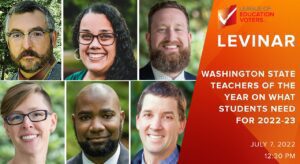 Although 2021-22 was the first full school year of in-person learning since the COVID pandemic began, it was anything but normal. In fact, students, families, and educators all say that this past year has been the most challenging year they have ever experienced.
Although 2021-22 was the first full school year of in-person learning since the COVID pandemic began, it was anything but normal. In fact, students, families, and educators all say that this past year has been the most challenging year they have ever experienced.
In this webinar, Washington state Teachers of the Year Jerad Koepp (2022), Brooke Brown (2021), Robert Hand (2019), Mandy Manning (2018, and the 2018 National Teacher of the Year), Nate Bowling (2016), and Lyon Terry (2015) share what they are hearing from students, parents, and colleagues in their community in the aftermath of the 2021-22 school year, what students need in preparation for the start of 2022-23, and what intangibles they teach students outside of academic curriculum. Students from across Washington state offer their perspectives.
Moderated by League of Education Voters Communications Director Arik Korman.
Panelists:
Laurel Lakoundji, a student at Western Washington University and a member of The Root of Our Youth
Michelle Mukasa, a student at Washington State University and a member of The Root of Our Youth
Waylon Menzia, a student at Mountain View High School in the Auburn School District and President of the Washington State High School Democrats
Jared Koepp, 2022 Washington state Teacher of the Year, North Thurston Public Schools
Brooke Brown, 2021 Washington state Teacher of the Year, Franklin Pierce School District
Robert Hand, 2019 Washington state Teacher of the Year, Mount Vernon School District
Mandy Manning, 2018 Washington state Teacher of the Year and 2018 National Teacher of the Year, Washington Education Association
Nate Bowling, 2016 Washington state Teacher of the Year, American Community School in Abu Dhabi, United Arab Emirates
Lyon Terry, 2015 Washington state Teacher of the Year, Highline Public Schools
Arik Korman, League of Education Voters
July 7, 2022
Archived Recording (Closed captioning is available in English, Spanish, and Somali)
A Listening Session with Voices from the Asian American and Pacific Islander Community
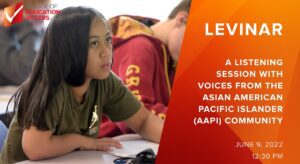
The COVID-19 pandemic and current racial justice movements have presented challenges and opportunities to students and families across Washington state. The Asian American and Pacific Islander (AAPI) community has been uniquely impacted by discrimination in recent years. To learn more and provide support, League of Education Voters believes in authentic engagement with the AAPI community.
In this webinar, a statewide panel of AAPI students, community leaders, educators, and advocates share their perspectives on current events and what works to effectively educate AAPI students in an equitable way.
Moderated by League of Education Voters Communications Director Arik Korman.
Panelists:
Yubi Mamiya, a senior at Shorewood High School, Shoreline Public Schools
Joseph Wai, a chemical engineering alumnus from the Washington State University Pullman Class of 2022
Joy Sebe, Assistant Director of Open Doors for Multicultural Families
Kamalei Brandon, Ethnic Studies Curriculum Specialist, Department of Liberatory Education at Seattle Public Schools, and creator of the Colorful Pages blog
Paul Tabayoyon, Community Outreach Coordinator at the Asian Pacific Islander Coalition of Yakima Valley
Kate Wobbema, a student at Pacific Northwest University of Health Sciences
Isabella Braganza, Administrative Coordinator at Pacific Northwest University of Health Sciences
Arik Korman, League of Education Voters
June 9, 2022
Archived Recording (Closed captioning is available in English, Spanish, and Somali)
Mental Health Supports Available to Washington Students
During these challenging times, youth mental health is front and center. Fortunately, there are programs across Washington state that provide much-needed supports.
In this webinar, we spotlight mental health programs and services that are currently available to students so that students, families, educators, and policymakers across Washington state can advocate for similar programs and services in their respective regions.
Moderated by League of Education Voters Communications Director Arik Korman.
Panelists:
Carissa Crum, a senior at Hoquiam High School, Hoquiam School District, Running Start student at Grays Harbor Community College, and Director of Community Outreach for the Washington state Legislative Youth Advisory Council (LYAC)
Baltazar Torres, the youth tri-lead for the Greater Columbia Family Youth System Partner (Southeast Washington FYSPRT)
Brissa Perez, Community and Tribal Engagement Specialist with Greater Columbia Accountable Community of Health, who discussed their Practice the Pause campaign
Daniel Perez, Assistant Director of Behavior and School Partnerships with Seneca Family of Agencies, who oversees multiple school partnerships and spoke to the supports available to youth through Seneca or services like theirs
Arik Korman, League of Education Voters
May 12, 2022
Archived Recording (Closed captioning is available in English, Spanish, and Somali)
Why the 2021-22 School Year Is So Challenging and Strategies to Support Students
2021-22 is the first full school year of in-person learning since the COVID pandemic began, but why is this year so challenging for students, parents, and educators?
In this webinar, David Lewis, Director of Behavioral Health Services at Seattle Public Schools and consultant to districts across Washington state and beyond, answers this important question and provides strategies to better support students moving forward. Students from across Washington state share feedback and stories from the classroom.
Moderated by League of Education Voters Communications Director Arik Korman.
Panelists:
Isaac Miller, a junior at Inglemoor High School in the Northshore School District and a member of The Root of Our Youth
Eyob Dessia, a freshman at Inglemoor High School in the Northshore School District and a member of The Root of Our Youth
Maham Khan, a freshman at West Valley High School in the West Valley School District, Yakima
Carissa Crum, a senior at Hoquiam High School, Hoquiam School District, Running Start student at Grays Harbor Community College, and Director of Community Outreach for the Washington state Legislative Youth Advisory Council (LYAC)
David Lewis, Director of Behavioral Health Services at Seattle Public Schools and a consultant to districts across Washington state on trauma-informed education practices and multi-tiered system of supports (MTSS)
Arik Korman, League of Education Voters
April 7, 2022
Archived Recording (Closed captioning is available in English, Spanish, and Somali) | Presentation Slides
Accessing a Remote Legislative Session
These past two Washington state legislative sessions have been historic. For the first time, the legislative process was conducted in a virtual format where committee meetings and public testimony were held on Zoom instead of in person.
In this webinar, we discuss how the virtual format impacts the ability of advocates to have their voices heard, know what conversations are happening in Olympia, and have the ability to pass thoughtful policies for students; and how the legislative process could be improved moving forward.
Moderated by League of Education Voters Communications Director Arik Korman.
Panelists:
Carissa Crum, a senior at Hoquiam High School, Hoquiam School District, Running Start student at Grays Harbor Community College, and Director of Community Outreach for the Washington state Legislative Youth Advisory Council (LYAC)
Jennifer Bereskin, Parent Advocate
Cara Bailey, Parent Advocate
Darya Farivar, Director of Public Policy at Disability Rights Washington
Jasmin Schmidt, Early Achievers Coach and Southeast Regional Policy Lead at Community-Minded Enterprises
Jene Ray, Associate Director of The ZoNe
Karen Pillar, Director of Policy and Advocacy at TeamChild
Misha Werschkul, Executive Director of the Washington State Budget & Policy Center
Terique Scott, League of Education Voters Legislative Associate
Arik Korman, League of Education Voters
March 31, 2022
Archived Recording (Closed captioning is available in English, Spanish, and Somali)
A Listening Session with Voices from the Latino Community, Part 4
COVID-19 has presented challenges to students and families across Washington state. And although every community faces similar issues, the pandemic has uniquely impacted some communities. To learn more and provide support, League of Education Voters believes in outreach to the Latino community in a culturally and linguistically appropriate way.
In this webinar, we have assembled a statewide panel of Latino thought leaders, community leaders, and educators to discuss how they serve their community, how to address the mental health of students and families, and what other supports Latino students need now.
This webinar is presented in Spanish, with closed captioning in English available.
Moderated by League of Education Voters Director of Field and Community Engagement Eric Holzapfel.
Panelists:
Annabel Quintero, Cultural Wellness Coach
Larissa Reza Garcia, College & Career Coordinator, Community Center for Education Results
Danny Herrera, College Success Foundation HERO Advisor, Grades 9-10, Yakima
Cecilia Gonzalez, Early Learning and Families Classes Manager, La Escuelita Early Learning Center, Yakima
Eric Holzapfel, League of Education Voters
March 24, 2022
Archived Recording (Closed captioning is available in English, Spanish, and Somali)
2022 Legislative Session Recap: What Washington Students Got
League of Education Voters Director of Policy and Research Jacob Vela and LEV partners from the Washington state Legislative Youth Advisory Council (LYAC), the OneAmerica Youth Advisory Council, Open Doors for Multicultural Families, Graduate Tacoma, the Washington State Governor’s Office of the Education Ombuds, ACLU Washington, Career Connect Washington, and the Tukwila School District Board share an overview of what happened in Olympia, status updates on our collective 2022 legislative platforms, and next steps to prepare for the 2023 legislative session.
Moderated by League of Education Voters Communications Director Arik Korman.
Panelists:
Shreya Shaji, a junior at North Creek High in Bothell, First Year member of the Washington state Legislative Youth Advisory Council (LYAC) and member of LYAC’s Equity Taskforce, and Student Representative on the Northshore School District’s Ethnic Studies Taskforce
Israel Lopez, a junior at Sedro Woolley High School, Running Start student, and first-year member of the Washington state Legislative Youth Advisory Council (LYAC)
Mahad Dahir, a member of the OneAmerica Youth Council
Emily Fung, Self-Advocacy Coordinator on the Advocacy and Civic Engagement Team at Open Doors for Multicultural Families
Ben Mitchell, Director of Policy & Advocacy at Graduate Tacoma
Rose Spidell, Senior Education Ombuds at the Washington State Governor’s Office of the Education Ombuds
Kendrick Washington, Director of the Policy Advisory Group at ACLU Washington
Andy Ferrera, Principal at Kinetic West, representing Career Connect Washington
Dave Larson, Director District 5 of the Tukwila School District Board of Directors
Jacob Vela, League of Education Voters
Arik Korman, League of Education Voters
March 17, 2022
Archived Recording (Closed captioning is available in English, Spanish, and Somali)
Students from Across Washington on What They Need Now and How to Advocate
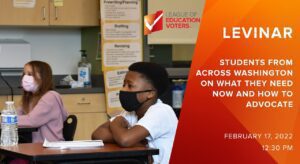
These are unprecedented and challenging times for students, both at school and at home.
In this webinar, student activists from across Washington state share how the current school year is going for them, what they need now to make things better, and ways to advocate to make it happen. Students joined us from The Root of Our Youth, Washington NAACP Youth Council, Washington Ethnic Studies Now Youth Advisory Board, OneAmerica Youth Council, the Washington state Legislative Youth Advisory Council (LYAC), and Gonzaga University.
Moderated by League of Education Voters Communications Director Arik Korman.
Panelists:
Imara Wangia, a sophomore at Garfield High School, Seattle Public Schools, and member of The Root of Our Youth
Rena Mateja, a senior at Cleveland High School, Seattle Public Schools, and member of the Washington NAACP Youth Council
Tara Ryan, a junior at Foss High School, Tacoma Public Schools, member of the Washington Ethnic Studies Now Youth Advisory Board, and chair of the Mayor’s Youth Commission of Tacoma
Jesse JudahBram, a junior at Redmond High School, Lake Washington School District, a OneAmerica Youth Leader, and youth advocate on the Redmond Arts & Culture Commission
Shae Dolan, a senior at Curtis High School, University Place School District, and Chair of the Washington state Legislative Youth Advisory Council (LYAC)
Amari Trinity Troutt, an Act Six Scholar at Gonzaga University
Analesa Mason, an Act Six Scholar at Gonzaga University
Arik Korman, League of Education Voters
February 17, 2022
Archived Recording (Closed captioning is available in English, Spanish, and Somali)
Student Perspectives on Washington’s PESB Draft Cultural Competency Diversity Equity & Inclusion (CCDEI) Standards
A major component of advancing equity in education is ensuring that each and every student learns from well-prepared educators. As such, a critical step in an educator’s preparation journey is their ability to demonstrate cultural responsiveness and center diversity, equity, and inclusion in the ways they support their students. Statewide standards equip educators with the tools they need to do this. Through Engrossed Substitute Senate Bill 5044, the Professional Education Standards Board (PESB) is leading a process of gathering community input and updating these standards in order to help ensure every educator in our state is prepared, trained, and equipped with the knowledge, skills, and tools necessary to create stronger, more supportive student-centered learning environments.
In this webinar, you will learn more about the Cultural Competency Diversity Equity & Inclusion standards and hear student feedback on the standards as well as their thoughts on how the standards can help create a more just and equitable education system for all of Washington’s students!
Special thanks to College Spark Washington for sponsoring this LEVinar. College Spark Washington supports the postsecondary dreams of students and their communities through grantmaking focused on dismantling racism in the education system.
Moderated by League of Education Voters Communications Director Arik Korman.
Panelists:
Charlie Fisher, a senior at Ridgefield High School in Southwest Washington, Vice Chair of the Washington state Legislative Youth Advisory Council (LYAC), and co-founder of Unite Ridgefield, a social justice club
Shreya Shaji, a junior at North Creek High in Bothell, First Year member of LYAC and member of LYAC’s Equity Taskforce, and Student Representative on the Northshore School District’s Ethnic Studies Taskforce
Dr. Erica Hernandez-Scott, Interim Executive Director of the Washington State Professional Educator Standards Board (PESB)
Heather Gingerich, Director of Strategic Initiative Partnerships, College Spark Washington
Arik Korman, League of Education Voters
February 10, 2022
Archived Recording (Closed captioning is available in English, Spanish, and Somali)
Why We Must Increase Language Access in Public Schools
Families have a right to communicate with schools to support their children’s education. A family’s right to Educational Language Access, which is defined as meaningful two-way communication between families and educators, is protected by both state and federal laws. However, qualified interpreters and accurate translations are not reliably provided for families. As a result, students are not able to equitably access their education and realize their full potential. This policy is particularly important to pass this 2022 Legislative Session because as we begin our third year in a global pandemic, families need to understand the school’s safety precautions, updates about COVID, and other health precautions.
We must establish effective language access services at public schools to support marginalized families, particularly English Language Learner families and disabled families, so that they can meaningfully engage in their child’s education. In this webinar, we share why increasing language access in public schools is important, what House Bill 1153 sponsored by Rep. Tina Orwall (D-33) would do, and answer your questions.
Panelists:
Israel Lopez, a junior at Sedro Woolley High School, Running Start student, and first-year member of the Washington state Legislative Youth Advisory Council (LYAC)
Adar Abdi, a junior at Evergreen High School in Highline Public Schools, Running Start student at South Seattle College, first-year member of community outreach for the Washington state Legislative Youth Advisory Council (LYAC), and current King County Equity Cabinet member
Aida Sanchez-Vela, a Certified Medical Spanish Interpreter and Court Interpreter, active with the first interpreters union in the United States, Interpreters United WFSE Local 1671
Moses Perez, Programs Manager on the Advocacy and Civic Engagement Team at Open Doors for Multicultural Families
Emily Fung, Self-Advocacy Coordinator on the Advocacy and Civic Engagement Team at Open Doors for Multicultural Families
Kaitie Dong, Leadership Development Manager at OneAmerica
Washington state Representative Tina Orwall (D-33)
Arik Korman, League of Education Voters
January 27, 2022
Archived Recording (Closed captioning is available in English, Spanish, and Somali)
What to Expect in the 2022 Legislative Session
During the 2022 legislative session, we must focus on community-driven solutions to support students and families who have been historically and systemically underserved – including students of color, students in poverty, students receiving special education services and students with disabilities, students learning English, students experiencing homelessness, and students impacted by trauma. We must use this moment as an opportunity to create meaningful and lasting change.
In this webinar, League of Education Voters Director of Policy and Research Jacob Vela and government relations consultant Carey Morris, along with LEV partners, give an overview of the 2022 legislative landscape, outline our priorities for the 2022 legislative session, and answer your questions.
Panelists:
Carissa Crum, a senior at Hoquiam High School, Hoquiam School District, Running Start student at Grays Harbor Community College, and Director of Community Outreach for the Washington state Legislative Youth Advisory Council (LYAC)
Ruby Coulson, a Junior at Sequim High School, Sequim School District, National Leader through 4-H, and Committee Member on Legislative Affairs for the Washington state Legislative Youth Advisory Council (LYAC)
Sharonne Navas, Co-Founder and Executive Director of the Equity in Education Coalition
Shirline Wilson, Washington state Director of Education Reform Now and Democrats for Education Reform, who is representing the Washington State Charter Schools Association
Carey Morris, Government Relations Consultant
Jacob Vela, League of Education Voters
Arik Korman, League of Education Voters
January 6, 2022
Archived Recording (Closed captioning is available in English, Spanish, and Somali)
Build Back Better and Supporting the Child Care Workforce in Washington state
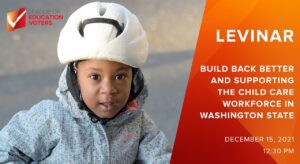
Early learning and school-age child care matters for our families, our businesses, and our future. Although children, families, and child care professionals across Washington state are still celebrating the passage of the Fair Start for Kids Act and its historic investments in early learning and school-age child care, much work remains to support the child care workforce.
In this webinar, Washington state Senator Claire Wilson and Representative Tana Senn, prime sponsors of the Fair Start for Kids Act, along with early learning and school-age child care providers, advocates, and students, outline how the federal Build Back Better Act will support child care in Washington state and which steps are needed to support the child care sector.
Moderated by League of Education Voters Communications Director Arik Korman.
Panelists:
Carissa Crum, a senior at Hoquiam High School, Hoquiam School District, Running Start student at Grays Harbor Community College, and Director of Community Outreach for the Washington state Legislative Youth Advisory Council (LYAC)
Washington state Senator Claire Wilson, prime sponsor of the Fair Start for Kids Act
Washington state Representative Tana Senn, prime sponsor of the Fair Start for Kids Act
Lois Martin, Director of the Community Day Center for Children in Seattle
Luc Jasmin III, Owner of Parkview Early Learning Center in Spokane and Board Treasurer of the Washington Childcare Centers Association
Susan Brown, President and CEO of Kids Co. in Seattle
Angela Griffin, Executive Director of Launch in Seattle
Stephan Blanford, Executive Director of Children’s Alliance
Arik Korman, League of Education Voters
December 15, 2021
Archived Recording (Closed captioning is available in English, Spanish, and Somali)
Honoring and Supporting Native Students
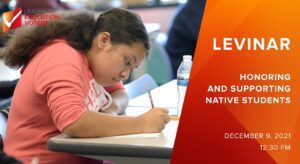
Indigenous peoples have had formal systems of education since time immemorial. The establishment of policies and processes which allow federally recognized tribes to grant viable high school credit for enrolled members increases sovereignty, self-determination, and is likely to increase Native student success in the public school system.
In this webinar, a statewide panel of Native students, educators, and policymakers discuss how our schools can better serve the educational needs of Native students. We focus on how the state legislature can support Native students by allowing their tribes to grant them viable high school credits for engaging in cultural curriculum and enrichment activities.
Moderated by League of Education Voters Director of Field and Community Engagement Eric Holzapfel.
Panelists:
Ivy Pete, a senior at North Central High School, Spokane Public Schools, second-year member of the Washington state Legislative Youth Advisory Council (LYAC), and the 2021 Washington State Indian Education Association Indian High Schooler of the Year
Tay Birdtail, a senior at North Thurston High School, North Thurston Public Schools
Jerad Koepp, 2022 Washington state Teacher of the Year and Native Student Program Specialist at North Thurston Public Schools
Mike Smith, Principal of Rochester High School, Rochester School District, and the main driver behind the passage of House Bill 1426, specifying minimum continuing education requirements for administrator and teacher certificate renewals that focus on equity-based school and classroom practices
Bill Kallappa, board member of the Washington State Board of Education and Education Liaison for the Nisqually Tribe
Willie Frank III, Chairman of the Nisqually Tribal Council
Hanford McCloud, Nisqually Tribal Council Member
Laura Lynn, Office of Native Education Program Manager at the Washington state Office of the Superintendent of Public Instruction (OSPI)
Eric Holzapfel, League of Education Voters
December 9, 2021
Archived Recording (Closed captioning is available in English and Spanish)
The Role of K-12 Schools in Addressing Racism, Part 3
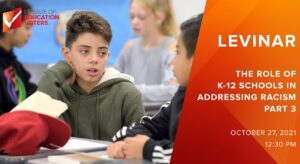
From a long history of police brutality and racism targeting the Black community to resistance against teaching about systemic racism embedded in our nation’s history, we are continuing to see disturbing examples of racism in the news. Last year, we witnessed some of the largest protests in U.S. history amidst a worldwide outcry against racial injustice. Since then, advocacy nonprofits such as League of Education Voters and state agencies like the Washington State Board of Education and the Office of the Superintendent of Public Instruction have been engaging with students of color to inform their work. Recurring incidents of racism are still impacting our youth in multiple ways, but how should K-12 schools respond?
In this webinar centering student voices, we have assembled a statewide panel of students, educators, and community leaders to discuss the impacts of racially motivated violence, presenting tools that can be used in schools to best support students on a daily basis and provide educators with appropriate skills to create well-rounded, historically accurate curricula.
Moderated by League of Education Voters Communications Director Arik Korman.
Panelists:
Sam Carver, a junior at Issaquah High School in the Issaquah School District and first-year member of the Washington state Legislative Youth Advisory Council (LYAC)
Ivy Pete, a senior at North Central High School in Spokane Public Schools and second-year member of the Washington state Legislative Youth Advisory Council (LYAC)
Dr. Tanisha Brandon-Felder, Director of Equity and Family Engagement at Shoreline Public Schools
Kendrick Washington, Youth Counsel at ACLU Washington
Arik Korman, League of Education Voters
October 27, 2021
Archived Recording (Closed captioning is available in English and Spanish)
Washington state Teachers of the Year on What Students Need for the 2021-22 School Year
These are unprecedented times in Washington state. In the 2021-2022 school year, school districts are offering a mix of in-person and virtual learning options. But how is this third year of the COVID-19 pandemic impacting students, and how can we best support them now?
In this webinar, Washington state Teachers of the Year Jerad Koepp (2022), Brooke Brown (2021), Amy Campbell (2020), Robert Hand (2019), Mandy Manning (2018, and the 2018 National Teacher of the Year), Nate Bowling (2016), and Lyon Terry (2015) share what they are hearing from students, parents, and colleagues in their community, and share what they recommend students need at the start of the 2021-22 school year. Students with the Washington state Legislative Youth Advisory Council (LYAC) offer their feedback. Moderated by League of Education Voters Communications Director Arik Korman.
Israel Lopez, a junior at Sedro-Woolley High School in Sedro-Woolley
Max Molgard, a senior at Mt. Spokane High School in Mead
Jared Koepp, 2022 Washington state Teacher of the Year, North Thurston Public Schools
Brooke Brown, 2021 Washington state Teacher of the Year, Franklin Pierce School District
Amy Campbell, 2020 Washington state Teacher of the Year, Camas School District
Robert Hand, 2019 Washington state Teacher of the Year, Mount Vernon School District
Mandy Manning, 2018 Washington state Teacher of the Year and 2018 National Teacher of the Year, Washington Education Association
Nate Bowling, 2016 Washington state Teacher of the Year, American Community School in Abu Dhabi, United Arab Emirates
Lyon Terry, 2015 Washington state Teacher of the Year, Highline Public Schools
Arik Korman, League of Education Voters
September 30, 2021
Archived Recording (Closed captioning can be enabled through YouTube)
Superintendents from Across Washington state on Student Mental Health, Family Engagement, and Going Back to School
As the 2021-22 school year begins, school districts across Washington state are focusing on student mental health and family engagement while determining what learning will look like as we emerge from the COVID-19 pandemic.
In this webinar, we have assembled a panel of superintendents from across Washington state who share what school will look like in their districts for the start of the 2021-22 school year, how they would reimagine education based on what they learned from the past school year, how they plan to address student mental health and family engagement, and what kinds of supports school districts in Washington need from the state as the school year gets underway. Students with the Washington state Legislative Youth Advisory Council (LYAC) offer their feedback. Moderated by League of Education Voters Communications Director Arik Korman.
Macey, a sophomore at Hanford High School in Richland
Jeremiah, a freshman at Rogers High School in Spokane
Renton School District Superintendent Damien Pattenaude
Richland School District Superintendent Shelley Redinger
Shoreline Public Schools Superintendent Susana Reyes
Sunnyside School District Superintendent Kevin McKay
Touchet School District Superintendent Robert Elizondo
Vancouver Public Schools Superintendent Jeff Snell
Arik Korman, League of Education Voters
August 26, 2021
Archived Recording (Closed captioning is available in English and Spanish)
Islamophobia in Schools
Although it has been 20 years since the tragic events of September 11, Islamophobia is still a challenge in Washington state schools.
In this webinar, we have assembled a statewide panel of students, educators, and community leaders to describe the impacts of Islamophobia and share strategies and resources to address Islamophobia when it arises. Our panelists are Maham Khan, a student at West Valley High School in Yakima; Dana Ahmed, a student at the University of Washington; Aneelah Afzali, Executive Director of the American Muslim Empowerment Network at the Muslim Association of Puget Sound; Naghmana Sherazi, with the Office of Diversity, Equity and Inclusion at Gonzaga University and candidate for Spokane City Council; Sabiha Khan, a history teacher at Kamiakin High School in Kennewick and community advocate in the Tri-Cities; and Zahra Khan-Roach, Executive Director of the Benton Franklin Children’s Developmental Center and member of the Pasco City Council. Moderated by League of Education Voters Communications Director Arik Korman.
Aneelah Afzali speaker request form: www.tinyurl.com/AMENSpeaker
Contact info for Sabiha Khan: sabiha.munian (at) gmail.com
Resources:
• FAQs about Islam/Muslims for those interested: https://ing.org/top-100-frequently-asked-questions-about-muslims-and-their-faith/
• Facts Over Fear campaign, www.factsoverfear.org
• ISPU Educators’ Toolkit, https://www.ispu.org/educators/
• How we can counteract Islamophobia in our schools – and our communities, https://www.afsc.org/blogs/news-and-commentary/how-we-can-counteract-islamophobia-our-schools-%E2%80%93-and-our-communities
• Creating Cultural Competences curriculum, https://www.creatingculturalcompetencies.org/curriculum.html
• Shifting the Narrative Resources: https://www.creatingculturalcompetencies.org/uploads/1/1/2/6/112618631/appendix_6.1.pdf
• Religious-Based Bullying: Insights on Research and Evidence-Based Best Practices, https://www.ispu.org/wp-content/uploads/2018/09/ISPU-AMHP-Religious-Based-Bullying.pdf?x46312
• Countering and Dismantling Islamophobia: A Guide for Individuals and Organizations, https://www.ispu.org/countering-and-dismantling-islamophobia-full-report/
• Bullying and Bias: Addressing Islamophobia in Schools, http://www.islamophobia.org/research/bullying-and-bias-in-schools.html
• Your dinner guest makes an Islamophobic comment. How do you respond?, https://www.afsc.org/blogs/news-and-commentary/your-dinner-guest-makes-islamophobic-comment-how-do-you-respond
• Youth presentations, if more youth want to speak up and get engaged: https://ing.org/youth-presentations/
Maham Khan, West Valley High School student
Dana Ahmed, University of Washington student
Aneelah Afzali, American Muslim Empowerment Network
Naghmana Sherazi, Gonzaga University
Sabiha Khan, Kamiakin High School
Zahra Khan-Roach, Benton Franklin Children’s Developmental Center and Pasco City Council
Arik Korman, League of Education Voters
July 1, 2021
Archived Recording (Closed captioning is available in English and Spanish)
The Role of K-12 Schools in Addressing Racially Motivated Violence, Part 2
From a long history of police brutality and racism targeting the Black community to a rise in attacks on the Asian American Pacific Islander community, we are continuing to see disturbing examples of racially motivated violence in the news. This past year, we have witnessed some of the largest protests in U.S. history amidst a worldwide outcry against racial injustice. Since then, social movements have been thrust into the national spotlight, with youth at the forefront of the conversation. Recurring incidents of racially motivated violence are impacting our youth in multiple ways, but how should K-12 schools respond?
In this webinar centering student voices, we have assembled a statewide panel of students, educators, and community organizers to discuss the impacts of racially motivated violence, presenting tools that can be used in schools to best support students on a daily basis. They also answer your questions.
Moderated by Denisha Saucedo, the 2018 Puget Sound Educational Service District Regional Teacher of the Year and 6th grade teacher at Kent Elementary School, and her daughter Alisha Saucedo, a graduating senior at Thomas Jefferson High School in the Federal Way Public Schools who will attend St. Martin’s University in the fall as an Act 6 Scholar.
Panelists:
Anvi Sehgal, an incoming sophomore at Ferris High School in Spokane Public Schools
Bradley Carrera, a graduating senior at Thomas Jefferson High School in Federal Way Public Schools who will attend Gonzaga University in the fall as an Act 6 Scholar
Lupita Huerta, an Act 6 Scholar attending St. Martin’s University
Rosie Zhou, a graduating senior from Ferris High School in Spokane Public Schools who will attend Columbia University in the fall
Brett Allen, an English Teacher at Kent Meridian High School in the Kent School District
Jasmine Linane-Booey, a kindergarten through 8th grade World Languages teacher at Spokane Public Montessori in Spokane Public Schools
Michael Wilson, a paraeducator who is pursuing his Master’s degree in teaching at Kentlake High School in the Kent School District
George Breland, Principal at Cleveland STEM High School in Seattle Public Schools
Nicole Rosenkrantz, Director of Community Relations and Partnerships in Spokane Public Schools
Arik Korman, League of Education Voters
June 24, 2021
Archived Recording (Closed captioning is available in English and Spanish)
A Listening Session with Voices from the Latino Community, Part 3
COVID-19 has presented challenges to students and families across Washington state. And although every community faces similar issues, the pandemic has uniquely impacted some communities. To learn more and provide support, League of Education Voters believes in outreach to the Latino community in a culturally and linguistically appropriate way.
In this webinar, we have assembled a statewide panel of Latino students, thought leaders, community leaders, and educators to share their perspectives on which investments need to be made and what the COVID recovery process should look like, what we need to see as we head back to in-person learning, and what we are looking forward to that we’ve missed during the pandemic. Panelists include Joseph Zuniga, a sophomore at Gonzaga University majoring in Biology; Virginia Herrera-Páramo, Executive Director of Para Los Niños; and Luis Ortega, Director & Founder of Storytellers for Change.
This webinar is presented in Spanish, with English interpretation available by enabling Subtitles/closed captions.
Moderated by League of Education Voters Director of Field and Community Engagement Eric Holzapfel.
Una sesión de escucha con voces de la comunidad latina, Parte 3
COVID-19 ha presentado desafíos para estudiantes y familias en todo el estado de Washington. Y aunque cada comunidad enfrenta problemas similares, la pandemia ha impactado de manera única a algunas comunidades. Para obtener más información y brindar apoyo, League of Education Voters cree en el acercamiento a la comunidad latina de una manera cultural y lingüísticamente apropiada.
En nuestro seminario web, hemos reunido un panel estatal de estudiantes latinos, líderes de opinión, líderes comunitarios y educadores para compartir sus perspectivas sobre qué inversiones deben realizarse y cómo debería ser el proceso de recuperación de COVID, qué necesitamos ver al regresar a aprendizaje personal, y lo que esperamos con ansias que nos hemos perdido durante la pandemia. Los panelistas incluyen a Joseph Zuniga, un estudiante de segundo año de la Universidad de Gonzaga con especialización en Biología; Virginia Herrera-Páramo, Directora Ejecutiva de Para Los Niños; y Luis Ortega, director y fundador de Storytellers for Change.
Este seminario web se presenta en español, con interpretación en inglés disponible habilitando Subtítulos.
Moderado por el Director de Participación Comunitaria de League of Education Voters, Eric Holzapfel.
Joseph Zuniga, Gonzaga University
Virginia Herrera-Páramo, Para Los Niños
Luis Ortega, Storytellers for Change
Eric Holzapfel, League of Education Voters
Arik Korman, League of Education Voters
June 3, 2021
Archived Recording (Closed captioning is available in English and Spanish)
The Fair Start for Kids Act
Early learning matters for our families, our businesses, and our future. Children, families, and early childhood professionals are celebrating the signing of the Fair Start for Kids Act and its historic investments in early learning. These strong investments in child care, quality pre-K, and other birth-to-5 services will help ensure that all children are thriving — and help Washington get back to work.
In this webinar, Washington state Representative Tana Senn and Senator Claire Wilson, prime sponsors of the Fair Start for Kids Act, along with early childhood education providers Luc Jasmin III from Parkview Early Learning Center in Spokane and Susan Yang from the Denise Louie Education Center in Seattle, explain how the newly signed omnibus legislation takes strong steps to address affordability, access, and the economic crisis. They also answer your questions. Moderated by League of Education Voters Communications Director Arik Korman.
Representative Tana Senn, Washington state Legislature
Senator Claire Wilson, Washington state Legislature
Luc Jasmin III, Parkview Early Learning Center and the Washington Childcare Centers Association
Susan Yang, Denise Louie Education Center
Arik Korman, League of Education Voters
May 12, 2021
Archived Recording (Closed captioning is available in English and Spanish) | Presentation Slides | Read the Recap
2021 Legislative Session Recap: What Washington Students Got
In the wake of the 2021 legislative session, League of Education Voters Director of Policy and Research Jacob Vela, government relations consultant Carey Morris, and LEV partners Jaelyn Sotelo from the Washington state Legislative Youth Advisory Council, Kendrick Washington from ACLU Washington, and Katara Jordan from Building Changes provide an overview of what happened in Olympia this session, along with status updates on LEV’s 2021 legislative priorities – early childhood education, supportive, safe and accessible learning environments, equitable resourcing structures centered on student need, and sufficient and equitable resources for every student receiving special education services. They also answer your questions and let you know what we can do to prepare for the upcoming session in 2022. Moderated by League of Education Voters Communications Director Arik Korman.
Jaelyn Sotelo, Washington state Legislative Youth Advisory Council
Kendrick Washington, ACLU Washington
Katara Jordan, Building Changes
Carey Morris, Government Relations Consultant
Jacob Vela, League of Education Voters
Arik Korman, League of Education Voters
May 5, 2021
Archived Recording (Closed captioning is available in English and Spanish)
Washington state Teachers of the Year on Reimagining Education after COVID
As we enter the final quarter of this historic and challenging school year, students, families, and educators across Washington are navigating remote, hybrid, and modified in-person learning environments. But what should education look like when all schools reopen?
In this webinar, Washington state Teachers of the Year Brooke Brown (2021), Amy Campbell (2020), Robert Hand (2019), Mandy Manning (2018, and the 2018 National Teacher of the Year), Camille Jones (2017), Nate Bowling (2016), and Lyon Terry (2015) share what they are hearing from students, families, and colleagues in their community on how the 2020-21 school year is going, how they recommend reimagining education based on what they have learned from teaching during the COVID pandemic, and answer your questions. Moderated by League of Education Voters Communications Director Arik Korman.
Brooke Brown, 2021 Washington state Teacher of the Year, Franklin Pierce School District
Amy Campbell, 2020 Washington state Teacher of the Year, Camas School District
Robert Hand, 2019 Washington state Teacher of the Year, Mount Vernon School District
Mandy Manning, 2018 Washington state Teacher of the Year and 2018 National Teacher of the Year, Washington Education Association
Camille Jones, 2017 Washington state Teacher of the Year, Quincy School District
Nate Bowling, 2016 Washington state Teacher of the Year, American Community School in Abu Dhabi, United Arab Emirates
Lyon Terry, 2015 Washington state Teacher of the Year, Highline Public Schools
Arik Korman, League of Education Voters
April 15, 2021
Archived Recording (Closed captioning is available in English and Spanish) | Read the Recap
The Role of K-12 Schools in Addressing Racially Motivated Violence
From police violence around the country to the marked increase in attacks on members of the Asian American Pacific Islander community, we are continuing to see disturbing examples of racially motivated violence in the news. Over the past year, social movements have been thrust into the national spotlight, with youth at the forefront of the conversation. Recent incidents are impacting them in multiple ways, but how should K-12 schools respond?
In this webinar, we have assembled a statewide panel of students, educators, and a community organizer to discuss the impacts of racially motivated violence and how schools can best support students on a daily basis. They also answer your questions. Moderated by League of Education Voters Communications Director Arik Korman.
Yubi, a junior at Shorewood High School, Shoreline School District, and the Director of Community Outreach with the Washington state Legislative Youth Advisory Council
Lily, a junior at Mabton High School, Mabton School District, and a Second Year Councilmember with the Washington state Legislative Youth Advisory Council
Ivy, a junior at North Central High School, Spokane Public Schools, and a First-Year Councilmember with the Washington state Legislative Youth Advisory Council
Zana, a junior at Bethel High School, Bethel School District, and a member of Root of Our Youth
Rena, a junior at Cleveland High School, Seattle Public Schools, and a member of the NAACP Youth Council
Marlo, a freshman at the University of Washington and a member of Root of Our Youth
Denisha Saucedo, 6th-grade teacher, Kent Elementary School, Kent School District, and the 2018 Regional Teacher of the Year from the Puget Sound Educational Service District
Jasmine Linane-Booey, kindergarten through 8th grade World Languages teacher, Spokane Public Montessori, Spokane Public Schools
Tina Van, Community Engagement Coordinator, Hilltop Peace and Community Center
Arik Korman, League of Education Voters
April 8, 2021
Archived Recording (Closed captioning is available in English and Spanish) | Read the Recap
Washington state Superintendent Chris Reykdal on State Assessments during the 2020-21 School Year
As the school year approaches its final quarter, school districts across Washington state traditionally begin administering the federally-mandated Smarter Balanced Assessments (SBA) in English Language Arts and Mathematics to all students in grades 3-8 and once in high school, as well as administering the Science SBA to students in grades 4, 7, and once in high school.
In this webinar, Washington state Superintendent of Public Instruction Chris Reykdal outlines this historic and challenging year’s requirements for state testing and answers your questions.
This LEVinar is meant to be a forum and opportunity for discussion, questions, and understanding about an issue that will affect many families this spring. Our goal is to support families in better understanding what to expect regarding statewide assessments. Moderated by League of Education Voters Communications Director Arik Korman.
Washington state Superintendent Chris Reykdal, Office of the Superintendent of Public Instruction (OSPI)
Arik Korman, League of Education Voters
March 23, 2021
Archived Recording (Closed captioning is available in English and Spanish) | Audio Transcript | Read the Recap
Principals from across Washington state on Education in the Time of COVID
As we approach the final quarter of this historic and challenging school year, principals across Washington are navigating remote, hybrid, and modified in-person learning environments for students, educators, and families.
In this webinar, we have partnered with the Association of Washington School Principals (AWSP) to assemble a panel of principals from across Washington state to discuss how the 2020-21 school year is going, how they would reimagine education based on what they have learned from this unprecedented school year, and how principals can be better supported at the state and district levels. They also answer your questions. Moderated by League of Education Voters Communications Director Arik Korman.
Jason Smith, Rogers High School, Puyallup School District
Tricia Kannberg, Regal Elementary School, Spokane Public Schools
Carlos Gonzalez, McFarland Middle School, Othello School District
Nathan Plummer, Sultan Middle School, Sultan School District
Cindy Cromwell, Kelso Virtual Academy, Kelso School District
John Belcher, Mount Si High School, Snoqualmie School District
Justin Hendrickson, South Shore PreK-8, Seattle Public Schools
Arik Korman, League of Education Voters
March 18, 2021
Archived Recording (Closed captioning is available in English and Spanish) | Audio Transcript | Read the Recap
Advancing Educator Diversity in Washington state
There is a significant disparity between the diversity of Washington’s students and educators: BIPOC (Black, Indigenous, and People of Color) youth make up nearly half of our student population, while more than 90% of our teachers and education leaders are white. Studies show that BIPOC students who are exposed to teachers who reflect their race and ethnicity have higher graduation rates, and when more of the adults in schools reflect the communities they serve, deeper, more authentic school/community partnership become well-positioned to transform schools in ways that dismantle racism and benefit from the wisdom and vision of families. In this moment of racial reckoning for our country, it is more important than ever to grow, sustain, and advance the priorities of BIPOC educators.
In this webinar co-presented with the College Spark Foundation, we have assembled a statewide panel including student activist Charlie Fisher of the Washington state Legislative Youth Advisory Council, founder of Unite Ridgefield, and advocate for legislation to diversify school curriculum, Alexandra Manuel, Executive Director of the Washington State Professional Education Standards Board, Dr. Mia Tuan, Dean of the University of Washington College of Education, Dr. Margarita Magana, Director of Outreach & Recruitment of the Heritage University Education Department, Dr. Goldy Brown III, Director of the Principal Certification Program at Whitworth University, and Dr. Gisela Ernst-Slavit, Professor of English Language Learners at Washington State University Vancouver Campus College of Education. Panelists discuss how educator and principal prep programs work to undo the injustices that have led to the current disparities between the diversity of students and educators, what more is needed, and how can we work together to support and sustain a diverse education workforce in Washington state. They also answer your questions. Moderated by League of Education Voters Communications Director Arik Korman.
Charlie Fisher, Washington state Legislative Youth Advisory Council and Unite Ridgefield
Alexandra Manuel, Washington State Professional Education Standards Board
Dr. Mia Tuan, University of Washington College of Education
Dr. Margarita Magana, Heritage University Education Department
Dr. Goldy Brown III, Whitworth University
Dr. Gisela Ernst-Slavit, Washington State University Vancouver Campus College of Education
Dr. Warren Brown, College Spark Foundation
Heather Gingerich, College Spark Foundation
Arik Korman, League of Education Voters
February 25, 2021
Archived Recording (Closed captioning is available in English and Spanish) | Audio Transcript | Read the Recap
Why Every Family Deserves a Fair Start
Early learning matters for our families, our businesses, and our future. Even before the COVID pandemic, lack of affordable child care was costing $6.5 billion annually in lost revenue and growth. Strong investments in child care, quality pre-K, and other birth-to-5 services can make sure that all children are thriving — and help Washington get back to work.
In this webinar, Washington state Representative Tana Senn and Senator Claire Wilson, prime sponsors of the Fair Start for Kids Act (House Bill 1213 and Senate Bill 5237), explain how their omnibus legislation takes strong steps to address child care and early learning affordability, access, and the economic crisis. They also answer your questions. Moderated by League of Education Voters Communications Director Arik Korman.
Representative Tana Senn, Washington state Legislature
Senator Claire Wilson, Washington state Legislature
Arik Korman, League of Education Voters
February 10, 2021
Archived Recording (Closed captioning is available in English and Spanish) | Presentation Slides | Audio Transcript | Read the Recap
A Listening Session with Voices from the Latino Community, Part 2
COVID-19 has presented challenges to students and families across Washington state. And although every community faces similar issues, the pandemic has uniquely impacted some communities. To learn more and provide support, League of Education Voters believes in outreach to the Latino community in a culturally and linguistically appropriate way.
In this webinar, we have assembled another statewide panel of Latino thought leaders, community leaders, and educators to share their perspectives on what is working, and not working, in their communities and what state legislators can do to better support Latino students. Panelists include Dr. Susana Reyes, Assistant Superintendent of Operations for the Pasco School District and Member of the Washington State Board of Education; Dr. Nydia A. Martinez, Director of the Chicana/o/x Studies Program, Academic Director of the College Assistance Migrant Program (CAMP), and Assistant Professor of History at Eastern Washington University (EWU); and Tanya Medina, Alianza Youth Leadership Co-Manager with the Latino Community Fund.
This webinar is presented in Spanish, with English interpretation available by enabling Subtitles/closed captions.
Moderated by League of Education Voters Director of Field and Community Engagement Eric Holzapfel.
Una sesión de escucha con voces de la comunidad latina, Parte 2
COVID-19 ha presentado desafíos para estudiantes y familias en todo el estado de Washington. Y aunque cada comunidad enfrenta problemas similares, la pandemia ha impactado de manera única a algunas comunidades. Para obtener más información y brindar apoyo, League of Education Voters cree en el acercamiento a la comunidad latina de una manera cultural y lingüísticamente apropiada.
En nuestro seminario web, hemos reunido otro panel estatal de líderes de pensamiento, líderes comunitarios y educadores latinos para compartir sus perspectivas sobre lo que funciona y lo que no funciona en sus comunidades y lo que los legisladores pueden hacer para apoyar mejor a los estudiantes latinos. Los panelistas incluyen la Dra. Susana Reyes, Asistente del Superintendente de Operaciones del Distrito Escolar de Pasco y Miembra de la Mesa de Educación del Estado de Washington; Dra. Nydia A. Martinez, Directora del Programa de Estudios Chicanos, Directora Académica del Programa Migrante de Asistencia Universitaria, y Profesora de Historia en Eastern Washington University (EWU); y Tanya Medina, Administradora de Alianza un grupo de liderazgo juvenil con Latino Community Fund.
Este seminario web se presenta en español, con interpretación en inglés disponible habilitando Subtítulos.
Moderado por el Director de Participación Comunitaria de League of Education Voters, Eric Holzapfel.
Dr. Susana Reyes, Pasco School District and the Washington State Board of Education
Dr. Nydia A. Martinez, Eastern Washington University
Tanya Medina, Latino Community Fund
Eric Holzapfel, League of Education Voters
Arik Korman, League of Education Voters
February 4, 2021
Archived Recording (Note: English interpretation is available by enabling Subtitles/closed captions) | Read the Recap
Our Rising Voices: Supporting Emergent Multilingual Students
In collaboration with the Road Map Project, League of Education Voters partner OneAmerica has published a new report, Our Rising Voices: A Call to Action to Support Emergent Multilingual Students.
For too long, our education systems have treated English language learners as a problem to be managed and minimized. This report instead highlights the systemic barriers that emergent multilingual students face and the actions we can all take to support them. It pinpoints five specific yet sweeping recommendations for building systemic changes and uplifting community voices.
In this webinar, OneAmerica Education Program Manager Nimco Bulale shares takeaways from the report and answers your questions. Moderated by League of Education Voters Communications Director Arik Korman.
Nimco Bulale, OneAmerica
Arik Korman, League of Education Voters
January 21, 2021
Archived Recording | Our Rising Voices report | Speak Your Language resources for families and educators | Read the Recap
What to Expect in the 2021 Legislative Session
During the 2021 legislative session, we must focus on community-driven solutions to support students and families who have been historically and systemically underserved – including students of color, students in poverty, students qualifying for special education services, students learning English, students experiencing homelessness, and students impacted by trauma. We must ensure that in this moment of crisis and opportunity, we create meaningful and lasting change.
In this webinar, League of Education Voters Director of Policy and Research Jacob Vela and government relations consultant Carey Morris give an overview of the 2021 legislative landscape, outline our priorities for the 2021 legislative session, and answer your questions. Moderated by League of Education Voters Communications Director Arik Korman.
Carey Morris, Government Relations Consultant
Jacob Vela, League of Education Voters
Arik Korman, League of Education Voters
January 7, 2021
Archived Recording | Audio Transcript | Read the Recap
A Listening Session with Voices from the Latino Community
COVID-19 has presented challenges to students and families across Washington state. And although every community faces similar issues, the pandemic has uniquely impacted some communities. To learn more and provide support, League of Education Voters believes in outreach to the Latino community in a culturally and linguistically appropriate way.
In this webinar, we have assembled a statewide panel of Latino thought leaders, community leaders, and educators to share their perspectives on current events and what works to effectively educate Latino students. Our panelists include Robert Elizondo, Superintendent of the Touchet School District; Suzy Diaz, Director of Collective Impact at Heritage University and convener of Yakima Valley Partners for Education; Maria Esther Zamora, English Language Development teacher at Spokane Virtual Academy; and Miguel Maestas, Housing and Economic Development Director of El Centro de la Raza. This webinar was presented in Spanish with English interpretation available. Moderated by League of Education Voters Director of Field and Community Engagement Eric Holzapfel and Communications Director Arik Korman.
Una sesión de escucha con voces de la comunidad latina
COVID-19 ha presentado desafíos para estudiantes y familias en todo el estado de Washington. Y aunque cada comunidad enfrenta problemas similares, la pandemia ha impactado de manera única a algunas comunidades. Para obtener más información y brindar apoyo, League of Education Voters cree en el acercamiento a la comunidad latina de una manera cultural y lingüísticamente apropiada.
En nuestro seminario web gratuito, hemos reunido un panel estatal de líderes de pensamiento, líderes comunitarios y educadores latinos para compartir sus perspectivas sobre los eventos actuales y lo que funciona para educar eficazmente a los estudiantes latinos. Nuestros panelistas incluyen a Robert Elizondo, superintendente del distrito de Touchet; Suzy Diaz, directora de impacto colectivo en Heritage University; Maria Esther Zamora, maestra de desarrollo de inglés en Spokane Virtual Academy; y Miguel Maestas, director de vivienda y desarrollo económico de El Centro de la Raza. Este seminario web se presentará en español con interpretación al inglés disponible.
Moderado por el Director de Participación Comunitaria de League of Education Voters, Eric Holzapfel, y el Director de Comunicaciones de League of Education Voters, Arik Korman
Robert Elizondo, Touchet School District
Suzy Diaz, Heritage University
Maria Esther Zamora, Spokane Virtual Academy
Miguel Maestas, El Centro de la Raza
Eric Holzapfel, League of Education Voters
Arik Korman, League of Education Voters
December 10, 2020
Archived Recording (Note: English interpretation closed captioning is available. It begins at 2:51 into the recording) | Read the Recap
Supporting Students Experiencing Homelessness in the Time of COVID
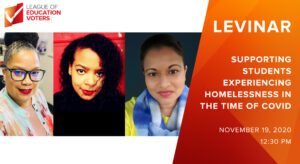
COVID-19 has impacted students and families across Washington state and throughout the world. And for students experiencing housing instability, the challenges of remote learning can feel insurmountable.
In this webinar, we have a conversation with Dr. Avanti Bergquist of the Renton School Board, Principal Jolene Grimes Edwards of Neah Bay High School, and social justice advocate ChrisTiana ObeySumner to discuss how systems can best serve students experiencing homelessness, especially students of color.
This LEVinar was co-hosted with our partner Building Changes, an organization focused on supporting students experiencing homelessness. Building Changes works across and within the education, health, and housing systems to address the needs of students and families impacted by Washington state’s housing crises. Through research, programming, and advocacy, Building Changes promotes equitable responses to support students and families experiencing homelessness across the state.
Together, we have a dialogue about the intersection of health, education, and racial equity when serving students furthest from educational justice. Moderated by League of Education Voters Communications Director Arik Korman.
Dr. Avanti Bergquist, Renton School District Board of Directors, Eating Recovery Center, and Pathlight Mood & Anxiety Center
Jolene Grimes Edwards, Neah Bay Junior/Senior High School
ChrisTiana ObeySumner, Epiphanies of Equity LLC
Mehret Tekle-Arawun, Building Changes
Arik Korman, League of Education Voters
November 19, 2020
Read the Recap
What Students Need Now
These are unprecedented times in Washington state. Most school districts are still doing remote learning and some are transitioning to hybrid learning models. But how are students navigating this historic school year, and how can we best support them now?
In this webinar, we partnered with The Root of Our Youth to assemble a panel of students from across Washington to share how they are doing and how we can help. They also answer your questions. Moderated by League of Education Voters Communications Director Arik Korman.
Sidney, senior at Woodinville High School in Woodinville
Phia, senior at Bothell High School in Bothell
Lily, sophomore at South Ridge High School in Kennewick
Maham, 8th grader at West Valley Junior High School in Yakima
Zana, junior at Bethel High School in Spanaway
Malachi, junior at University High School in Spokane
Tara, junior at Bothell High School in Bothell
Diya, junior at Bothell High School in Bothell
Dr. Rhoan Garnett, YXM (Youth Experiencing Mentoring) Consulting and WeBe (We Bridge Belonging)
Arik Korman, League of Education Voters
October 28, 2020
Archived Recording | Read the Recap
A Listening Session with Voices from the African-American Community, part 2
What works for African-American students works for all students. In the wake of lives lost in the African-American community, League of Education Voters has committed to listen, learn from, and amplify voices of the African-American community because they are at the center of the movement for racial justice.
In this webinar, we have assembled another statewide panel of African-American thought leaders, community leaders, business owners, and educators to share their perspectives on current events and what works to effectively educate African-American students. Our panelists include Dr. Debra R. Sullivan, educator, Past President of the Seattle Affiliate of the National Black Child Development Institute (BCDI-Seattle), and author of Cultivating the Genius of Black Children; Dr. Marcus Pimpleton, Executive Director for Equity, Partnerships, and Student Engagement for the Yakima School District; Debrena Jackson Gandy, national best-selling author, 25-year business owner, keynote speaker, Founder of Seattle’s ELEVATE Empowerment Movement, and former college Trustee; and Dr. Thelma Jackson, owner of Foresight Consulting, Former college Trustee, former multi-term school board member and Chair, and has served on Task Forces and Advisory Councils for five Governors of the State of Washington. Moderated by League of Education Voters Communications Director Arik Korman.
Dr. Debra R. Sullivan, author of Cultivating the Genius of Black Children
Dr. Marcus Pimpleton, Yakima Public Schools
Dr. Thelma Jackson, Foresight Consulting
Debrena Jackson Gandy, ELEVATE Empowerment Movement
Arik Korman, League of Education Voters
October 14, 2020
Archived Recording
A Listening Session with Voices from the African-American Community
What works for African-American students works for all students. In the wake of lives lost in the African-American community, League of Education Voters has committed to listen, learn from, and amplify voices of the African-American community because they are at the center of the movement for racial justice.
In this webinar, we have assembled a statewide panel of African-American thought leaders, community leaders, business owners, and educators to share their perspectives on current events and what works to effectively educate African-American students. Our panelists include Debrena Jackson Gandy, national best-selling author, 25-year business owner, keynote speaker, Founder of Seattle’s ELEVATE Empowerment Movement, and former college Trustee; Dr. Thelma Jackson, owner of Foresight Consulting, Former college Trustee, former multi-term school board member and Chair, and has served on Task Forces and Advisory Councils for five Governors of the State of Washington; Dr. Timmie Foster, ABD, Owner of Foster Enterprise, Founder of 100 Leading Ladies of Color, and Program Supervisor Lead for College and Career Readiness at the Washington state Office of the Superintendent of Public Instruction (OSPI); Jerrall Haynes, President of the Spokane Public Schools Board; and Rashad Norris, Director of Community Engagement at Highline College. Moderated by League of Education Voters Communications Director Arik Korman.
Debrena Jackson Gandy, ELEVATE Empowerment Movement
Dr. Thelma Jackson, Foresight Consulting
Dr. Timmie Foster, Foster Enterprise and the Washington state Office of the Superintendent of Public Instruction (OSPI)
Jerrall Haynes, Spokane Public Schools
Rashad Norris, Highline College
Arik Korman, League of Education Voters
September 23, 2020
Archived Recording
Superintendent Chris Reykdal on the Start of the 2020-21 School Year
As the 2020-21 school year begins, school districts across Washington state are implementing remote and hybrid learning plans. Students, parents, and educators will be navigating these systems and expectations.
In this webinar, Washington state Superintendent Chris Reykdal outlines the current status of our schools and answers your questions. Moderated by League of Education Voters Communications Director Arik Korman.
Superintendent Chris Reykdal, Office of the Superintendent of Public Instruction (OSPI)
Arik Korman, League of Education Voters
September 2, 2020
Archived Recording
Superintendents from Across Washington state on Racial Equity and Going Back to School
As plans for the 2020-21 school year are being finalized, school districts across Washington state are focusing on racial equity while developing updated learning plans, and students, parents, and educators are trying to navigate new systems and expectations.
In this webinar, Highline Public Schools Superintendent Dr. Susan Enfield, Kent School District Superintendent Dr. Calvin Watts, Northshore School District Superintendent Dr. Michelle Reid, Bellingham Public Schools Superintendent Dr. Greg Baker, Kennewick School District Superintendent Dr. Traci Pierce, and Davenport School District Superintendent Jim Kowalkowski share how racial equity is being addressed during this historic time, describe what school will look like in their districts for the start of the 2020-21 school year, outline what kinds of support school districts in Washington need from the state as the school year gets underway, and answer questions. Moderated by League of Education Voters Communications Director Arik Korman.
Dr. Susan Enfield, Highline Public Schools
Dr. Calvin Watts, Kent School District
Dr. Michelle Reid, Northshore School District
Dr. Greg Baker, Bellingham Public Schools
Dr. Traci Pierce, Kennewick School District
Jim Kowalkowski, Davenport School District
Arik Korman, League of Education Voters
August 11, 2020
Archived Recording | COVID-19 Resources | Read the Recap
Washington Teachers of the Year on What Students Need for Going Back to School
These are unprecedented times in Washington state. School districts are finalizing plans for reopening schools, and many have chosen online and hybrid learning models. But how have the COVID-19 school closures impacted students, and how can we best support them in the fall?
In this webinar, Washington state Teachers of the Year Amy Campbell (2020), Robert Hand (2019), Mandy Manning (2018, and the 2018 National Teacher of the Year), Camille Jones (2017), and Nate Bowling (2016) share what they are hearing from students, parents, and colleagues in their community, share what students need to begin the 2020-21 school year, and answer your questions. Moderated by League of Education Voters Communications Director Arik Korman.
Amy Campbell, 2020 Washington state Teacher of the Year
Robert Hand, 2019 Washington state Teacher of the Year
Mandy Manning, 2018 Washington state Teacher of the Year and 2018 National Teacher of the Year
Camille Jones, 2017 Washington state Teacher of the Year
Nate Bowling, 2016 Washington state Teacher of the Year
Arik Korman, League of Education Voters
August 5, 2020
Archived Recording | COVID-19 Resources
Fostering First Steps Toward Racial Healing
Historically, the race conversation and topic are treacherous waters to navigate and the ‘colorblind’ approach has robbed us of the framework, language, and power to effectively address and dismantle it.
In this webinar, TED speaker and Brownicity.com creator Dr. Lucretia Berry, author of What LIES Between Us: Fostering First Steps Towards Racial Healing, describes how parents and teachers can talk to their children and students about race and race-related trauma. She also answers your questions. Moderated by League of Education Voters Communications Director Arik Korman.
Dr. Lucretia Berry, Brownicity – Many Hues, One Humanity
Arik Korman, League of Education Voters
July 29, 2020
Archived Recording | COVID-19 Resources
Why Students Need to Go Outdoors
Overwhelming research shows health and emotional benefits to recess, exercise, and free outdoor play.
In this webinar, Dr. Pooja Tandon of Seattle Children’s and the University of Washington, Bookie Gates, Servant Leader, Baseball Beyond Borders/Gates Ventures Group, Seattle Public Schools parent Linnea Westerlind, author of Discovering Seattle Parks: A Local’s Guide, and KUOW Education Reporter Ann Dornfeld discuss the mental health benefits of recess and PE programs in schools, outline what we need now to support school districts in Washington state to incorporate exercise programs into curriculum during this period of distance or hybrid learning, and answer your questions. Moderated by League of Education Voters Communications Director Arik Korman.
Dr. Pooja Tandon, King County Play Equity Coalition, Seattle Children’s, and the University of Washington
Bookie Gates, King County Play Equity Coalition, Baseball Beyond Borders, and the Gates Ventures Group
Linnea Westerlind, King County Play Equity Coalition and author of Discovering Seattle Parks: A Local’s Guide
Ann Dornfeld, KUOW
Arik Korman, League of Education Voters
July 15, 2020
Archived Recording | COVID-19 Resources
Raising Antiracist White Kids – Steps on Parenting for Racial Justice
Real challenges exist when it comes to raising white children in a society that is full of racial injustice. Talking about race means naming white privilege and hierarchy. How do we do this honestly, without making children feel bad about being white?
In this webinar, award-winning educator and public speaker Dr. Jennifer Harvey, author of Raising White Kids: Bringing Up Children in a Racially Unjust America, talks about how to teach white children to notice race and how to address racism when they encounter it. She also answers your questions. Moderated by League of Education Voters Communications Director Arik Korman.
Dr. Jennifer Harvey, Drake University
Arik Korman, League of Education Voters
June 30, 2020
Archived Recording | COVID-19 Resources
Retooling During the Pandemic: Serving Youth in Foster Care Statewide
Thousands of children, youth, and young adults in foster care statewide have been impacted by COVID-19. Already vulnerable before the pandemic, youth saw their immediate needs change dramatically with technology assistance for online school surfacing as the first obstacle to overcome. Many young adults living independently lost their jobs, which increased the need for rent assistance and other critical supports.
In this webinar, Treehouse Chief Policy & Strategy Officer Dawn Rains shares how the nonprofit organization took immediate action to respond to the challenges of COVID-19, outlines how we can best support students in foster care, and answers your questions. Moderated by League of Education Voters Communications Director Arik Korman.
Dawn Rains, Treehouse
Arik Korman, League of Education Voters
June 26, 2020
Archived Recording | COVID-19 Resources
Los Padres como Maestros
Con el cambio de escuela en el futuro previsible debido a COVID-19, los padres se han convertido en el maestro principal de sus hijos. Reconocemos que la educación en el hogar es un desafío para la mayoría de nosotros. Afortunadamente, hay muchas herramientas disponibles para que los padres involucren a sus alumnos en el aprendizaje continuo.
En este seminario web, un panel de educadores de padres de un programa local de Padres y Maestros discute cómo los padres han sido impactados por COVID-19, describe cómo los niños aprenden de diferentes maneras, comparte ejemplos de horarios de aprendizaje y proporciona estrategias de afrontamiento para usar durante estos estresantes vices. Moderado por la League of Education Voters, director regional de campo de Tri-Cities, Ruvine Jiménez.
Araceli Parbol, Los Padres como Maestros, Yakima Valley Farm Workers Clinic
Erica Castro, Los Padres como Maestros, Yakima Valley Farm Workers Clinic
Margarita Gutierrez, Los Padres como Maestros, Yakima Valley Farm Workers Clinic
Carina Sanchez, Los Padres como Maestros, Yakima Valley Farm Workers Clinic
Ruvine Jiménez, League of Education Voters
Arik Korman, League of Education Voters
17 de junio de 2020
Grabación archivada | Diapositivas de presentación | Presentation Slides | Recursos COVID-19
Superintendents from Across Washington state on Racial Equity and Learning during COVID-19
As guidelines for reopening schools in the fall are being finalized, school districts across Washington state are now focusing on racial equity while implementing continuous learning plans, and students, parents, and educators are trying to navigate new systems and expectations.
In this webinar, Seattle Superintendent Denise Juneau, Spokane Superintendent Shelley Redinger, Federal Way Superintendent Tammy Campbell, Everett Superintendent Ian Saltzman, North Kitsap Superintendent Laurynn Evans, and Freeman Superintendent Randy Russell share how racial equity is being addressed during this historic time, describe which approaches to COVID-19 remote learning are currently working, and outline what we need now to support school districts in Washington state. Moderated by League of Education Voters Communications Director Arik Korman.
Denise Juneau, Superintendent, Seattle School District
Shelley Redinger, Superintendent, Spokane School District
Tammy Campbell, Superintendent, Federal Way School District
Ian Saltzman, Superintendent, Everett School District
Laurynn Evans, Superintendent, North Kitsap School District
Randy Russell, Superintendent, Freeman School District
Arik Korman, League of Education Voters
June 11, 2020
Archived Recording | COVID-19 Resources
Two Schools on Keeping Students Engaged During COVID-19
With school buildings closed at least through the current academic year, schools across Washington state are implementing continuous learning plans. Students, parents, and educators are trying to navigate new systems and expectations. One of the biggest challenges schools face is how to keep every student engaged.
In this webinar, two schools join us from different sides of Washington state. The Community School in Spokane, which serves students in grades 9-12, and South Shore PreK-8 in Seattle share what is working and how they are navigating these historic times. They also answer your questions. Moderated by League of Education Voters Communications Director Arik Korman.
Dr. Cindy McMahon, Principal, The Community School, Spokane School District
Justin Hendrickson, Principal, South Shore PreK-8, Seattle School District
Arik Korman, League of Education Voters
June 3, 2020
Archived Recording | COVID-19 Resources
Superintendent Chris Reykdal on Washington Schools during COVID-19
Due to the COVID-19 pandemic, all public and private schools in Washington state are closed until the end of the academic year in June. School districts across Washington state are implementing continuous learning plans, and students, parents, and educators are trying to navigate new systems and expectations.
In this webinar, Washington state Superintendent Chris Reykdal outlines the current status of our schools and answers your questions. Moderated by League of Education Voters Communications Director Arik Korman.
Superintendent Chris Reykdal, Office of the Superintendent of Public Instruction (OSPI)
Arik Korman, League of Education Voters
May 22, 2020
Archived Recording | LEVinar Transcript | COVID-19 Resources
Now Is the Time to Redefine School
During this time of school closures and continuous learning, disparities in educational justice are growing rapidly. When students finally do return to the classroom, why should we return to a system that isn’t serving every student?
In this webinar, Trish Millines Dziko, Executive Director of TAF (Technology Access Foundation), shares TAF’s vision of building a more impactful education system that disrupts centuries of racial inequities, enables us to bring out and nurture the genius in every child, and honors teachers as professionals. She goes through short and long term goals as well as what needs to be true to implement that vision. She also answers your questions. Moderated by League of Education Voters Communications Director Arik Korman.
Trish Millines Dziko, Technology Access Foundation
Arik Korman, League of Education Voters
May 13, 2020
Archived Recording | Presentation Slides | COVID-19 Resources
Student Mental Health Supports and Social-Emotional Learning during COVID-19
School closures and these uncertain times are difficult for students to navigate, and behavioral experts suggest that the COVID-19 disruptions will cause at least one Adverse Childhood Experience (ACE). Mental health supports and social-emotional learning are more important than ever.
In this webinar, Tammy Bolen, Social Emotional Learning Program Supervisor in the Office of Student Support at the Office of the Superintendent of Public Instruction (OSPI), Ann Gray, Behavioral Health and Suicide Prevention Program Supervisor at OSPI, David Lewis, Director of Behavioral Health Services at Seattle Public Schools and a national expert on complex childhood trauma, Jenny Morgan, President of the Washington School Counselor Association (WSCA) and High School Counselor in the Olympia School District, Kayla Chung, WSCA Committee Member and Elementary School Counselor in the Bellevue School District, Michelle Rolen, WSCA Board Member and Middle School Counselor in the Yelm School District, and Jorge Torres, WSCA Committee Member and High School Counselor in the Tukwila School District, describe which services are currently available and which services are still needed, and answer your questions. Moderated by League of Education Voters Communications Director Arik Korman.
Tammy Bolen, Office of the Superintendent of Public Instruction (OSPI)
Ann Gray, Office of the Superintendent of Public Instruction (OSPI)
David Lewis, Seattle Public Schools
Jenny Morgan, High School Counselor in the Olympia School District
Kayla Chung, Elementary School Counselor in the Bellevue School District
Michelle Rolen, Middle School Counselor in the Yelm School District
Jorge Torres, High School Counselor in the Tukwila School District
Arik Korman, League of Education Voters
May 7, 2020
Archived Recording | COVID-19 Resources
Supporting Early Childhood Education in Washington state during COVID-19
About one-quarter of all licensed childcare centers in Washington state – at least 1,600 at last count – have closed due to COVID-19. Those centers served as many as 80,000 children. Childcare providers that remain open struggle with new, stringent safety protocols, maintaining their educator workforce, and dwindling enrollment, raising concerns about the state of childcare once the stay-at-home order is lifted.
In this webinar, childcare providers Luc Jasmin in Spokane and Ginger Still in the Tri-Cities, OneAmerica Education Program Manager Nimco Bulale, Washington State Association of Head Start & ECEAP Executive Director Joel Ryan, Children’s Alliance Interim Early Learning Policy Director Hannah Lidman, and Erica Hallock of the Washington Home Visiting Advocacy Coalition convened by Ounce Washington discuss the status of early learning in Washington state and what is needed now, and answer your questions. Moderated by League of Education Voters Communications Director Arik Korman.
Luc Jasmin, Parkview Early Learning Center in Spokane County
Ginger Still, Kid’s World Childcare in the Tri-Cities
Nimco Bulale, OneAmerica
Joel Ryan, Washington State Association of Head Start & ECEAP
Hannah Lidman, Children’s Alliance
Erica Hallock, Washington Home Visiting Advocacy Coalition (and League of Education Voters Board Member)
Arik Korman, League of Education Voters
April 29, 2020
Archived Recording | COVID-19 Resources
Superintendent Chris Reykdal on High School Seniors and Services for Students and Families
Due to the COVID-19 pandemic, all public and private schools in Washington state are closed until the end of the academic year in June. High school seniors have new clarity about graduation expectations, and school districts across Washington state are trying to provide technology access, meals, and childcare to students and their families.
In this webinar, Washington state Superintendent Chris Reykdal outlines the current status of our schools and answers your questions. Moderated by League of Education Voters Communications Director Arik Korman.
Superintendent Chris Reykdal, Office of the Superintendent of Public Instruction (OSPI)
Arik Korman, League of Education Voters
April 23, 2020
Archived Recording | LEVinar Transcript | COVID-19 Resources
Washington Teachers of the Year on the State of Education during COVID-19
These are unprecedented times in Washington state. Parents have suddenly become homeschool teachers, and educators are scrambling to provide continuous distance learning opportunities.
In this webinar, Washington state Teachers of the Year Amy Campbell (2020), Robert Hand (2019), Mandy Manning (2018, and the 2018 National Teacher of the Year), Camille Jones (2017), and Lyon Terry (2015) share what they are hearing from students, parents, and colleagues in their community, share insights on education during COVID-19, and answer your questions. Moderated by League of Education Voters Communications Director Arik Korman.
Amy Campbell, 2020 Washington state Teacher of the Year
Robert Hand, 2019 Washington state Teacher of the Year
Mandy Manning, 2018 Washington state Teacher of the Year and 2018 National Teacher of the Year
Camille Jones, 2017 Washington state Teacher of the Year
Lyon Terry, 2015 Washington state Teacher of the Year
Arik Korman, League of Education Voters
April 14, 2020
Archived Recording | COVID-19 Resources
2020 Washington state Teacher of the Year Amy Campbell on Teaching Our Kids During the Coronavirus Crisis
Many parents across Washington state are trying to do Coronavirus Triple Duty: working, parenting, and teaching from home. Also, educators across the state are scrambling to find effective ways to engage students during this unprecedented time.
In this webinar, 2020 Washington state Teacher of the Year Amy Campbell shares how she is supporting students and parents, and answers your questions. Amy is a special education teacher, and she is finding ways to use accommodations and strategies that support students with disabilities in the classroom so that they can engage in remote learning. These strategies are useful for all students. Moderated by League of Education Voters Communications Director Arik Korman.
Amy Campbell, 2020 Washington state Teacher of the Year
Arik Korman, League of Education Voters
March 31, 2020
Archived Recording | Presentation Slides | Amy Campbell’s YouTube channel | COVID-19 Resources
Superintendent Chris Reykdal on Supporting Students and Families during the Coronavirus Crisis
Due to the COVID-19 pandemic, all public and private schools in Washington state are closed at least through April 24th. No matter what we do, kids are going to fall behind in the next month because of this health crisis. The ramifications in all of our schools will be huge.
Beyond that, there are other impacts on families. Many parents cannot afford to take six weeks (or more) away from their jobs, do not have the ability to work from home, or cannot take extended sick leave. What happens to these parents? And what about the kids who rely on free and reduced-price meals? How will extended closures affect our most vulnerable children?
With all of these realities, State Superintendent of Public Instruction Chris Reykdal helps us focus on what we CAN do. In this webinar, Superintendent Reykdal outlines the current state of our schools and answers your questions. We will also share resources for students, parents, and school districts, which is available on our COVID-19 Resources page. Moderated by League of Education Voters Communications Director Arik Korman.
Superintendent Chris Reykdal, Office of the Superintendent of Public Instruction (OSPI)
Ellie Bridge, League of Education Voters
Arik Korman, League of Education Voters
March 19, 2020
Archived Recording | COVID-19 Resources
2020 Legislative Session Recap: What Washington Got
In the wake of the 2020 legislative session, the League of Education Voters Policy and Government Relations team provide an overview of what happened in Olympia this session, along with status updates on special education, supportive and safe schools, early childhood education, and fair K-12 education funding. They also answer your questions and let you know what we can do to prepare for the upcoming budget year session in 2021. Moderated by League of Education Voters Communications Director Arik Korman.
Carey Morris, Lobbyist
Julia Warth, League of Education Voters
Arik Korman, League of Education Voters
March 17, 2020
Archived Recording | Presentation Slides | 2020 Washington Legislative Session Recap
Making Early Learning More Affordable and Accessible in Washington state
Two pieces of legislation introduced in the Washington state House and Senate would make early childcare and education more affordable and more accessible for Washington state families. The bipartisan Fair Start for Kids Act (House Bill 2661), introduced by Representative Tana Senn (D-Mercer Island), would reduce child care copays, support child care providers, and fund more child care facilities. Senator Claire Wilson (D-Auburn) introduced the Early Care and Education Action (Senate Bill 6253), which would create a comprehensive statewide early care and education system by improving accessibility and affordability of early care and education programs for families.
In this webinar, Representative Senn describes how their legislation would improve early childhood education in Washington state and answers your questions. Moderated by League of Education Voters Communications Director Arik Korman.
Representative Tana Senn, Washington state Legislature
Arik Korman, League of Education Voters
February 27, 2020
Archived Recording
What to Expect in the 2020 Legislative Session
In the 2020 legislative session, League of Education Voters will prioritize policies to help lay the foundation of an equitable educational system that provides what students need, when and where they need it.
In this webinar, the League of Education Voters Team gives an overview of the 2020 landscape; outlines the possibilities in 2020 around sufficient and effective resources for every student receiving special education services, supportive and safe learning environments for every student in K-12 schools, equitable levy and local effort assistance structures targeted to student needs, and high-quality early childhood education for every early learner; and answers your questions. Moderated by League of Education Voters Communications Director Arik Korman.
Carey Morris, Lobbyist
Julia Warth, League of Education Voters
Arik Korman, League of Education Voters
January 14, 2020
Archived Recording | Presentation Slides
New Graduation Pathways for the Class of 2020
The Washington State Board of Education has revised rules concerning high school graduation requirements that take effect with the Class of 2020. The new rules have been revised in response to House Bill 1599 (passed in the 2019 legislative session) which eliminated the Certificate of Academic Achievement high school diploma that students previously earned by passing the Smarter Balanced Assessment (SBA) or completing an alternative demonstration of college and career readiness. The legislation replaced this requirement with eight pathways students may choose to graduate.
In this webinar, Steve Smith, Executive Director of the Black Education Strategy Roundtable, provides an overview of the new high school graduation rules and answers your questions. Moderated by League of Education Voters Communications Director Arik Korman.
Steve Smith, Black Education Strategy Roundtable
Arik Korman, League of Education Voters
December 19, 2019
Archived Recording | Washington State Board of Education Graduation Pathway Options webpage
Universal Design for Learning (UDL): An Introduction
Universal Design for Learning (UDL) is an educational framework based on research in learning sciences, including cognitive neuroscience, that guides the development of flexible learning environments that can accommodate individual learning differences by anticipating barriers within the environment (including the curriculum) and planning for them in advance. It recognizes each student learns in a unique manner and offers flexible ways to learn and multiple ways to meet expectations. It empowers teachers to think differently about their practice and focuses on educational outcomes for all, including students with disabilities.
In this webinar, Diana Marker, Director of School Services at the Washington State Charter Schools Association, provides an overview of Universal Design for Learning and answers your questions. Moderated by League of Education Voters Communications Director Arik Korman.
Diana Marker, Washington State Charter Schools Association
Arik Korman, League of Education Voters
November 18, 2019
Archived Recording | Presentation Slides
Incorporating Student Choice into Dual Credit and Career Technical Education
During the 2019 legislative session, lawmakers made policy changes that create different pathways to meeting graduation requirements. But how do these new pathways connect students with success after high school?
The Bellingham School District is an exemplar of how to do this right. In this webinar, Jeff Tetrick, Director of Teaching and Learning for Career and Technical Education, and Steve Clarke, Assistant Superintendent of Teaching and Learning, share how a 4×8 schedule supports student choice, culminating in their dual credit and Career Technical Education programs, and answer your questions. Moderated by League of Education Voters Communications Director Arik Korman.
Jeff Tetrick, Bellingham School District
Steve Clarke, Bellingham School District
Arik Korman, League of Education Voters
October 31, 2019
Archived Recording | Presentation Slides
How to Ensure Equity and Rigor in Dual Credit and Career Technical Education
During the 2019 legislative session, lawmakers made policy changes that create different pathways to graduation. But do these new pathways actually prepare students for success after high school?
The West Valley School District in Yakima is an exemplar of how to do this right. In this webinar, team members from West Valley outline their strategic approach to supporting every student throughout their educational journey, culminating in their dual credit and CTE programs, and answer your questions. Moderated by LEV Communications Director Arik Korman.
Dr. Mike Brophy, West Valley School District
Chris Nesmith, West Valley School District
Dr. Peter Finch, West Valley School District
Arik Korman, League of Education Voters
September 5, 2019
Archived Recording | Presentation Slides
The Current State of K-12 Education Funding
The Washington state legislature has continued work on school funding in the aftermath of the Supreme Court’s McCleary ruling, but inequities between school districts remain.
In this webinar, League of Education Voters Director of Policy and Research Julia Warth outlines education funding changes made in the 2019 session, illustrates current funding inequities through interactive maps of Washington’s 295 school districts, and answers your questions. Moderated by LEV Communications Director Arik Korman.
Julia Warth, League of Education Voters
Arik Korman, League of Education Voters
July 10, 2019
Archived Recording | Presentation Slides | View Interactive Maps
How to Implement Mental Health Supports in Schools
In order to learn, students need to feel like school is a place where they are supported. A key component is providing reliable and consistent access to mental health services for students through either staff or third-party providers in every school building.
In this webinar, team members from the University of Washington’s School Mental Health Assessment, Research, & Training (SMART) Center describe how to encourage and enable school districts to create positive, supportive school climates by implementing a multi-tiered system of support (MTSS) framework to identify and meet student needs. They also answer your questions. Moderated by LEV Communications Director Arik Korman.
Eric Bruns, UW SMART Center
Kelcey Schmitz, UW SMART Center
Arik Korman, League of Education Voters
June 4, 2019
Archived Recording | Presentation Slides
Special Education from a Rural and Urban Perspective
During the 2019 Legislative Session, lawmakers have said they will fully fund special education services in Washington state.
In this webinar, Davenport School District Superintendent Jim Kowalkowski and Stacy Dym, Executive Director of The Arc of King County, give an overview of which special education services are currently being provided in their respective regions and what is still needed. They also answer your questions. Moderated by League of Education Voters Communications Director Arik Korman.
Jim Kowalkowski, Davenport School District
Stacy Dym, The Arc of King County
Arik Korman, League of Education Voters
March 26, 2019
Archived Recording | Presentation Slides
Advocacy 101
Nearly each and every one of us has had to advocate for our children in some way. Believe it or not, advocating to policymakers is not very different. Most important of all, legislators want to hear from you. They want to hear about what is most important for you, and for what you believe your student needs to be successful.
In this webinar, League of Education Voters Spokane Regional Field Director Sandra Jarrard takes the fear out of advocacy and answers your questions. You will learn tools and techniques, and emerge knowing that you have an important story to share with legislators, school board members, and other policymakers, and that when you speak up, it makes a difference. Moderated by League of Education Voters Communications Director Arik Korman.
Sandra Jarrard, League of Education Voters
Arik Korman, League of Education Voters
February 21, 2019
Archived Recording | Presentation Slides
What to Expect in the 2019 Legislative Session
In 2019, LEV is working to target supports for students.
League of Education Voters Director of Policy and Research Julia Warth and Lobbyist Carey Morris give an overview of the 2019 landscape; outline the possibilities in 2019 around special education, supportive and safe schools, fair local K-12 funding, high-quality early childhood education, and access to postsecondary opportunities; and answer your questions. Moderated by League of Education Voters Communications Director Arik Korman.
Carey Morris, Lobbyist
Julia Warth, League of Education Voters
Arik Korman, League of Education Voters
January 10, 2019
Archived Recording | Presentation Slides
The Special Education Landscape in Washington
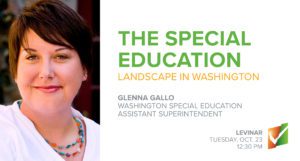 When we focus on improving special education, we lift the tide for all students.
When we focus on improving special education, we lift the tide for all students.
In this webinar, Washington Special Education Assistant Superintendent Glenna Gallo outlines the current state of special education funding, describes her vision for special education moving forward, and answers your questions. Moderated by League of Education Voters Chief Advocacy Officer Kelly Munn.
Glenna Gallo, Office of the Superintendent of Public Instruction (OSPI)
Kelly Munn, League of Education Voters
October 23, 2018
Archived Recording | Presentation Slides | Glenna Gallo’s answers to remaining questions
Finances Behind Teacher Salary Negotiations
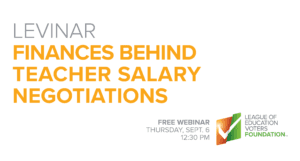
As the 2018-2019 school year gets underway, teacher salary discussions across Washington state are front-and-center.
In this webinar, League of Education Voters Chief Advocacy Officer Kelly Munn explains what teacher salary negotiations are and how they work, how teachers are paid, what a collective bargaining agreement (CBA) is, how to find your school district’s current teacher contract, and what happens when negotiations break down. She also answers your questions, along with League of Education Voters Senior Policy Analyst Jacob Vela. Moderated by League of Education Voters Communications Director Arik Korman.
Kelly Munn, League of Education Voters
Jacob Vela, League of Education Voters
Arik Korman, League of Education Voters
September 6, 2018
Archived Recording | Presentation Slides
Concrete Practices to Support Students Impacted by ACEs and Complex Trauma

Childhood experiences, both positive and negative, have a tremendous impact on lifelong health and opportunity. Much of the foundational research in this area has been referred to as Adverse Childhood Experiences (ACEs).
In this webinar, David Lewis, Director/Program Manager of Behavioral Health Services at Seattle Public Schools, introduces trauma-responsive practices to support a student’s ability to be successful, and answers your questions. Moderated by League of Education Voters State Field Director Kelly Munn.
David Lewis, Seattle Public Schools
Kelly Munn, League of Education Voters
June 28, 2018
Archived Recording | Presentation Slides
Education Funding Inequities Across Washington: A Deeper Dive
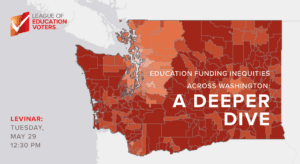
Although the Legislature’s recent multi-billion-dollar investments in our education system were intended to fully fund education, inequities still persist.
In this webinar, League of Education Voters Senior Policy Analyst Jacob Vela uses interactive maps to illustrate funding disparities across the state. We also go down to the district level to better understand how the changes impact similar districts and highlight what legislative changes contributed to the disparities between similar districts. We look at how support for free and reduced lunch students, homeless students, English language learners, and special education students varies across the state. Moderated by League of Education Voters State Field Director Kelly Munn.
Jacob Vela, League of Education Voters
Kelly Munn, League of Education Voters
May 29, 2018
Presentation Slides | View Seattle and Tukwila funding infographic
Education Funding Inequities Across Washington
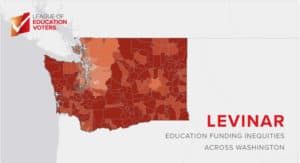
Although the Legislature’s recent multi-billion-dollar investments in our education system were intended to fully fund education, inequities still persist.
In this webinar, League of Education Voters Senior Policy Analyst Jacob Vela illustrates these inequities through interactive maps of Washington’s 295 school districts, and answers your questions. Moderated by League of Education Voters State Field Director Kelly Munn.
Jacob Vela, League of Education Voters
Kelly Munn, League of Education Voters
May 15, 2018
Archived Recording | View Interactive Maps
Proposed Changes to the Student Discipline Rules
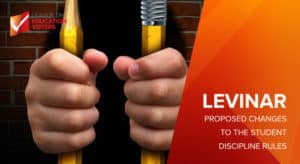
Washington state is continuing the process of revising student discipline regulations to set limits on the use of long-term suspension or expulsion, require districts to provide educational services during any suspension or expulsion, and require family engagement and due process for students subject to disciplinary action.
Vanessa Hernandez, Youth Policy Director at ACLU Washington, and Paul Alig, Managing Attorney at Team Child, describe the latest proposed changes in student discipline rules, how you can provide input on the rules, and answer your questions. Moderated by League of Education Voters State Field Director Kelly Munn.
Vanessa Hernandez, ACLU Washington
Paul Alig, Team Child
Kelly Munn, League of Education Voters
April 17, 2018
Archived Recording | Presentation Slides | Submit your comment to OSPI
Changes to Education Finance in Washington state
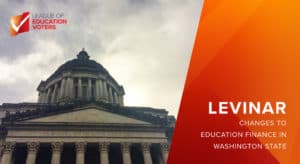
Now that the 2018 legislative session is over, lawmakers made some changes to how money flows from the state to your school district.
Julia Warth, League of Education Voters Assistant Director of Policy and Government Relations, and Jake Vela, League of Education Voters Senior Policy Analyst, will explain which school funding proposals passed in the 2018 legislative session and answer your questions. Moderated by League of Education Voters Field Director Kelly Munn.
Julia Warth, League of Education Voters
Jake Vela, League of Education Voters
Kelly Munn, League of Education Voters
March 13, 2018
Archived Recording | Presentation Slides
Co-Designing Family Engagement

Our work to ensure every student, especially children of color, in Washington state is college and career ready cannot be done without the involvement of families and community. In this webinar, Southeast Seattle Education Coalition Executive Director Erin Okuno shares a best practice on how to engage caregivers and communities of color, and answers your questions. Moderated by League of Education Voters Field Director Kelly Munn.
Erin Okuno, Southeast Seattle Education Coalition
Kelly Munn, League of Education Voters
March 8, 2018
Archived Recording | Presentation Slides | SESEC Family Engagement Survey
The 2018 Education Funding Proposals, Side-By-Side
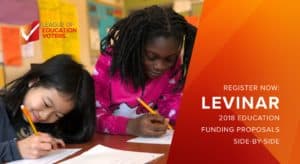
The Legislature made significant changes to the K-12 education funding structures in 2017—infusing more than $7 billion in state money into the system over four years through House Bill 2242. As the fiscal impacts of these changes become clearer, legislators proposed a range of adjustments to address concerns that districts have voiced around HB 2242.
Julia Warth, League of Education Voters Assistant Director of Policy and Government Relations, and Jake Vela, League of Education Voters Senior Policy Analyst, explain the various funding proposals and answer your questions. Moderated by League of Education Voters Field Director Kelly Munn.
Julia Warth, League of Education Voters
Jake Vela, League of Education Voters
Kelly Munn, League of Education Voters
February 22, 2018
Archived Recording | 2018 Supplemental Budget Side-By-Side | 2018 Funding Proposal Side-By-Side | Full Supplemental Budget documents
The 2018 Legislative Session and 2017 in Review
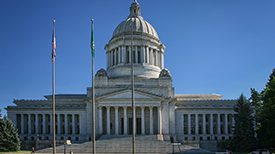
2017 was a monumental year, as legislators invested $7.3 billion into our education system, but plenty of work remains.
League of Education Voters Assistant Director of Policy and Government Relations Julia Warth gives an overview of 2017’s accomplishments, outlines the possibilities in 2018 around K-12 funding, early childhood education, expanded learning opportunities, student supports, career connected learning, postsecondary supports, and answers your questions. Moderated by League of Education Voters State Field Director Kelly Munn.
Julia Warth, League of Education Voters
Kelly Munn, League of Education Voters
January 4, 2018
Archived Recording | Presentation Slides
The Latest Washington Supreme Court McCleary Ruling
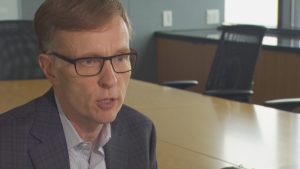
Last month, the Washington Supreme Court issued its latest order in the McCleary public education funding case, addressing whether the State has finally met its responsibility to fully fund basic education. In a unanimous opinion, the Supreme Court ruled that the State’s plan to fully fund basic education will provide enough resources to meet its constitutional responsibility, but the Court also ruled that the legislature’s timeline for achieving full funding takes too long.
In this webinar, former Washington Attorney General Rob McKenna, now co-chair of the Orrick law firm’s Public Policy Group, provides more information about the latest McCleary ruling and answers your questions. Moderated by League of Education Voters State Field Director Kelly Munn.
Rob McKenna, Orrick
Kelly Munn, League of Education Voters
December 19, 2017
Archived Recording
How Washington’s Student Outcomes Compare with Other States
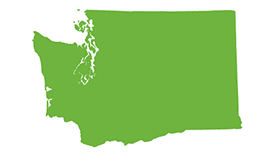
When examining high school graduation rates, Washington state ranks 41st in the country. However, USA Today recently reported that Washington is the 7th best state for education. And other data states Washington is the 2nd worst when it comes to closing achievement gaps. Where do we really stand?
The Education Trust gives an overview of how Washington truly compares with other states, and answers your questions on how we can make our education system better for every student. Moderated by League of Education Voters Communications Director Arik Korman.
Allison Rose Socol, The Education Trust
Natasha Ushomirsky, The Education Trust
Arik Korman, League of Education Voters
October 24, 2017
Archived Recording | Presentation Slides | NAEP State Academic Performance and Improvement Tool
Next Steps in School Discipline

During the 2016 legislative session, House Bill 1541 was passed and signed into law. This bill is based on several recommendations of the Educational Opportunity Gap Oversight and Accountability Committee (EOGOAC) that are intended to close the educational opportunity gap in WA. Sections of this bill set limits on the use of long-term suspension or expulsion, and require districts to provide educational services during any suspension or expulsion.
Joshua Lynch and Calandra Sechrist from the Office of the Superintendent of Public Instruction (OSPI) share updates regarding student discipline and implementation of HB 1541 and answer your questions. Moderated by LEV communications director Arik Korman.
Joshua Lynch, Office of the Superintendent of Public Instruction (OSPI)
Calandra Sechrist, Office of the Superintendent of Public Instruction (OSPI)
Arik Korman, League of Education Voters
September 28, 2017
Archived Recording | Presentation Slides
Washington’s Plan for the Every Student Succeeds Act

The Every Student Succeeds Act (ESSA), which goes into full effect in the 2018–19 school year, rolled back much of the federal government’s big footprint in education policy, on everything from testing and teacher quality to low-performing schools. And it gave new leeway to states in calling the shots. ESSA’s goal is ensure that every student, regardless of race, income, disability, ethnicity, or proficiency in English, is ready for a fulfilling career, college, and life.
Gayle Pauley, Assistant Superintendent for Special Programs and Accountability at the Office of the Superintendent of Public Instruction (OSPI), outlines Washington’s ESSA plan and how you can get involved. Moderated by LEV communications director Arik Korman.
Gayle Pauley, Office of the Superintendent of Public Instruction (OSPI)
Arik Korman, League of Education Voters
August 24, 2017
Archived Recording | Presentation Slides
What You Need to Know about the McCleary School Funding Agreement
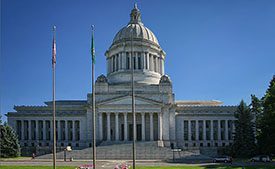
In what was quite literally years in the making, the Legislature has at long last presented and passed a K-12 funding solution. And, perhaps surprisingly in today’s political climate, it was passed with strong bipartisan support. Daniel Zavala, League of Education Voters Director of Policy and Government Relations, gives details about the plan and answers your questions. Moderated by LEV communications director Arik Korman.
Daniel Zavala, League of Education Voters
Arik Korman, League of Education Voters
July 25, 2017
Archived Recording | Presentation Slides
How ACEs and Complex Trauma Impacts Student Learning
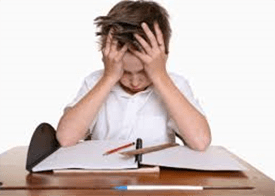
Childhood experiences, both positive and negative, have a tremendous impact on lifelong health and opportunity. Much of the foundational research in this area has been referred to as Adverse Childhood Experiences (ACEs). David Lewis, Director/Program Manager of Behavioral Health Services at Seattle Public Schools, describes how trauma impacts a student’s ability to be successful, and shares best assessment and teaching practices. Moderated by LEV communications director Arik Korman.
David Lewis, Seattle Public Schools
Arik Korman, League of Education Voters
July 20, 2017
Archived Recording | Presentation Slides
Activating Education and Justice Communities to Support Youth in Crisis
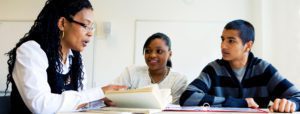
When kids start to disconnect from school, it’s a critical warning sign. Chronic absences are all too frequently the start of a path that leads straight to involvement in the juvenile justice system. Thousands of kids each year begin a journey on this “school-to-prison pipeline,” and we miss out on generations of leaders, innovators, educators, and entrepreneurs.
Justice Bobbe Bridge, Founding President and CEO of the Center for Children & Youth Justice, describes how schools can engage troubled youth in strong relationships with caring adults. Moderated by LEV State Field Director Kelly Munn.
Justice Bobbe Bridge, Center for Children & Youth Justice
Kelly Munn, League of Education Voters
June 20, 2017
Archived Recording | Presentation Slides
How to Retain and Support Teachers of Color
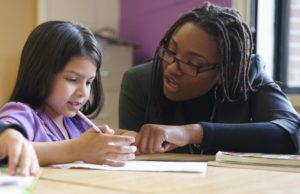
Currently, 44 percent of students in Washington public schools are students of color, but only 8 percent of teachers in Washington are teachers of color.
Dr. Min Sun, Assistant Professor in the University of Washington College of Education, shares her recent study on Black teachers’ retention and transfer patterns in North Carolina, and how these patterns vary by teacher effectiveness, subjects and school conditions. She also discusses policy strategies for retaining and supporting effective Black teachers. UW College of Ed Associate Dean for Research Deborah McCutchen also provides perspective on how research can inform advocacy. Moderated by LEV State Field Director Kelly Munn.
Dr. Min Sun, University of Washington College of Education
Dr. Deborah McCutchen, University of Washington College of Education
Kelly Munn, League of Education Voters
May 25, 2017
Archived Recording | Presentation Slides
2017 Legislative Session Update: Where We Stand
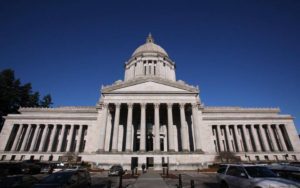
Now that the regular legislative session is over and a special session is under way, LEV Policy and Government Relations Director Daniel Zavala provides status updates on education funding, educator compensation, student supports, accountability, early learning, and higher education. Moderated by LEV State Field Director Kelly Munn.
Daniel Zavala, League of Education Voters
Kelly Munn, League of Education Voters
April 27, 2017
Archived Recording | Presentation Slides
How Early Learning Fits into the Education Continuum
 A major issue in public education today is closing the achievement gap so that every student is ready for college, career and life. This goal requires high quality early education for every child. Research repeatedly confirms that students who attend a high quality early learning program perform far better than those who do not. They are more academically successful, able to persevere through adversity, and more likely to graduate from high school.
A major issue in public education today is closing the achievement gap so that every student is ready for college, career and life. This goal requires high quality early education for every child. Research repeatedly confirms that students who attend a high quality early learning program perform far better than those who do not. They are more academically successful, able to persevere through adversity, and more likely to graduate from high school.
Learn how early learning fits into the education continuum from Jennifer Jennings-Shaffer, Early Learning Policy Director at the Children’s Alliance, and Ryan Pricco, Director of Advocacy and Policy at Child Care Aware of Washington. Moderated by LEV State Field Director Kelly Munn.
Jennifer Jennings-Shaffer, Children’s Alliance
Ryan Pricco, Child Care Aware of Washington
Kelly Munn, League of Education Voters
March 21, 2017
Archived Recording | Presentation Slides
Student Supports, an Integral Component of Basic Education

Part of defining basic education is determining what each and every student should have access to in their school. Currently, our system does not guarantee access to student supports that are critical to many students’ academic success — including support staff like counselors, school social workers or nurses, targeted strategies to improve school climate and address non-academic barriers to learning, and programming like additional tutoring. There are a number of approaches we can take to making sure that students receive the supports and resources they need.
Sarah Butcher, Co-Founder of SEL for Washington and President of the Bellevue Special Needs PTA, shared which student support programs we would like to see available in Washington state. And Julia Warth, LEV’s Assistant Director of Policy and Government Relations, provided details on what is happening now. Moderated by LEV State Field Director Kelly Munn.
Sarah Butcher, SEL for Washington
Julia Warth, League of Education Voters
Kelly Munn, League of Education Voters
February 28, 2017
Archived Recording | Presentation Slides part 1 | Presentation Slides part 2
Career Connected Learning and STEM
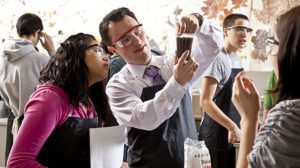
Many young people in Washington, especially youth of color and from low income or rural communities, do not have access to the career connected learning experiences that foster engagement in school and interest and preparation for high-demand STEM careers.
Washington STEM Chief Policy and Strategy Officer Caroline King and Senior Program Officer Gilda Wheeler taught us how career connected learning can benefit students, how career technical education (CTE) and career connected learning are connected, and how to support CTE and career connected learning through policy and program work. Moderated by LEV State Field Director Kelly Munn.
Caroline King, Washington STEM
Gilda Wheeler, Washington STEM
Kelly Munn, League of Education Voters
January 23, 2017
Archived Recording | Presentation Slides
What to Expect in the 2017 Legislative Session
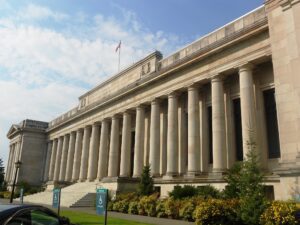
The McCleary education funding lawsuit will likely take center stage in the upcoming legislative session. But this year, several of the players are different. In addition to McCleary, other education issues will include expanding capacity for high quality early learning programs and fully supporting the State Need Grant to increase college access.
Daniel Zavala, LEV’s Director of Policy and Government Relations, explained the legislative landscape and answered your questions on how the 2017 session will unfold. Moderated by LEV State Field Director Kelly Munn.
Daniel Zavala, League of Education Voters
Kelly Munn, League of Education Voters
December 20, 2016
Archived Recording | Presentation Slides
Education Funding Takeaways from California
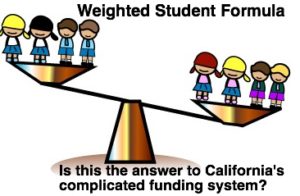
As our Washington state legislature contemplates how to best address the McCleary education funding lawsuit, LEV is studying how California handled a similar problem. Prior to 2014, the California education funding system lacked transparency and was difficult for parents, policymakers and taxpayers to understand. In addition, under the previous system, districts received notably different per-pupil funding rates; affluent schools often received more funding per pupil than less affluent ones.
Governor Jerry Brown proposed a new school finance plan for California in the 2013–2014 budget, called “Local Control Funding Formula.” It increased funding to school districts with a larger number of disadvantaged students by financially weighting those students according to need, simplified current byzantine school finance regulations, and gave school districts more autonomy over finances.
Sharonne Navas, Executive Director of the Equity in Education Coalition, visited California to see firsthand how their new system is working. She presented her findings and answered your questions on whether California’s new education funding system can create better outcomes for Washington students. Moderated by LEV State Field Director Kelly Munn.
Sharonne Navas, Equity in Education Coalition
Kelly Munn, League of Education Voters
November 29, 2016
Archived Recording | Presentation Slides
OSPI Roles and Responsibilities
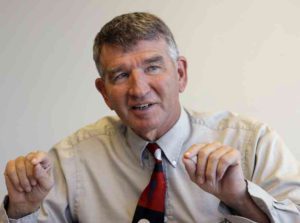
One of the most important races in the election is for the next state Superintendent of Public Instruction. But what does the Office of the Superintendent of Public Instruction (OSPI) actually do?
Randy Dorn, our current state superintendent, and Gil Mendoza, deputy superintendent, answer your questions about OSPI’s role and work, which levers OSPI has to make changes in education policy, and what the community should expect from OSPI. Moderated by LEV’s Communications Director, Arik Korman.
Randy Dorn and Gil Mendoza, Office of the Superintendent of Public Instruction (OSPI)
Arik Korman, League of Education Voters
October 27, 2016
Archived Recording
Expanded Learning Opportunities

Education does not stop when the school bell rings. So young people’s access to high-quality expanded learning opportunities—afterschool, in the summer and throughout the year – should grow. Expanded learning opportunities complement classroom instruction with programs that build lifelong skills, improve academic performance, and inspire young people to discover their individual passions. Culturally responsive and high-quality programming is critical to making expanded learning successful.
Stephanie Lennon and David Beard from School’s Out Washington explain expanded learning, its role in helping students succeed and grow, how it can close gaps, and how you can help make this happen. Moderated by our State Field Director, Kelly Munn.
Also, if you live in King County, check out the most comprehensive way to find engaging programs that support and enrich the lives of young people ages 5 to young adult here.
Stephanie Lennon and David Beard, School’s Out Washington
Kelly Munn, League of Education Voters
September 22, 2016
Archived Recording | Presentation Slides
The Opportunity Gap Bill: Next Steps
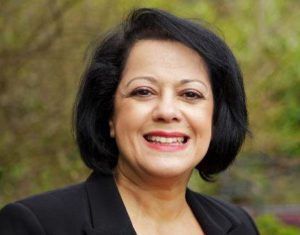
Substitute House Bill 1541, which went into effect June 9, will soon play out in schools. Under the new law, students will no longer be suspended or expelled for discretionary offenses and better statewide data on student demographics will ensure that the system is working to keep all students on track and in school. All students suspended or expelled will receive educational services and school staff will be provided with new trainings that are sensitive to culture and positively support all students’ growth.
Learn more from Rep. Lillian Ortiz-Self, who currently serves as vice-chair of the House Education Committee and is also a member of the Early Learning and Human Services, and the Transportation committees. She is co-chair of the Educational Opportunity Gap Oversight and Accountability Committee and a member of the Education Committee for the National Council of State Legislators. Moderated by our State Field Director, Kelly Munn.
Rep. Lillian Ortiz-Self (D-21)
Kelly Munn, League of Education Voters
August 23, 2016
Archived Recording | Presentation Slides
Every Student Succeeds Act (ESSA): What You Need to Know, Part 1
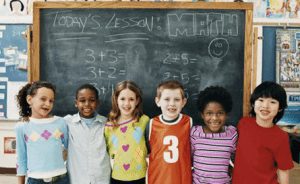
The new Every Student Succeeds Act, which takes full effect in the 2017-18 school year, rolls back much of the federal government’s big footprint in education policy, on everything from testing and teacher quality to low-performing schools. And it gives new leeway to states in calling the shots. That’s a big change from the No Child Left Behind Act (NCLB), which ESSA replaced and updated.
In part one of this two-part LEVinar series, Tukwila School Board Member (and LEV June Activist of the Month) Mary Fertakis answers your questions on how ESSA will affect Washington state’s education system. Moderated by our State Field Director, Kelly Munn.
Mary Fertakis, Tukwila School Board
Kelly Munn, League of Education Voters
July 19, 2016
Archived Recording | Presentation Slides
Every Student Succeeds Act (ESSA): What You Need to Know, Part 2

The new Every Student Succeeds Act, which takes full effect in the 2017-18 school year, rolls back much of the federal government’s big footprint in education policy, on everything from testing and teacher quality to low-performing schools. And it gives new leeway to states in calling the shots. That’s a big change from the No Child Left Behind Act (NCLB), which ESSA replaced and updated.
In part two of this two-part LEVinar series, Tukwila School Board Member (and LEV June Activist of the Month) Mary Fertakis answers your questions on what ESSA could do for civil rights and equity. Moderated by our State Field Director, Kelly Munn.
Mary Fertakis, Tukwila School Board
Kelly Munn, League of Education Voters
July 21, 2016
Archived Recording | Presentation Slides
